The fact that Elder and Sister H would indeed be going back to the U.S. on 1 December 2021 finally began to register with our co-workers and friends about the middle of November. Our last week in New Zealand thus featured some going-away gatherings that had to be carefully managed to avoid violating any COVID-related restrictions. It was important for us to meet face-to-face with as many people as possible because it had been so long—in most cases, three months—since we had been able to see museum volunteers, members of our ward, and other meaningful acquaintances. We met the challenge with a number of farewell parties held mostly out-of-doors.
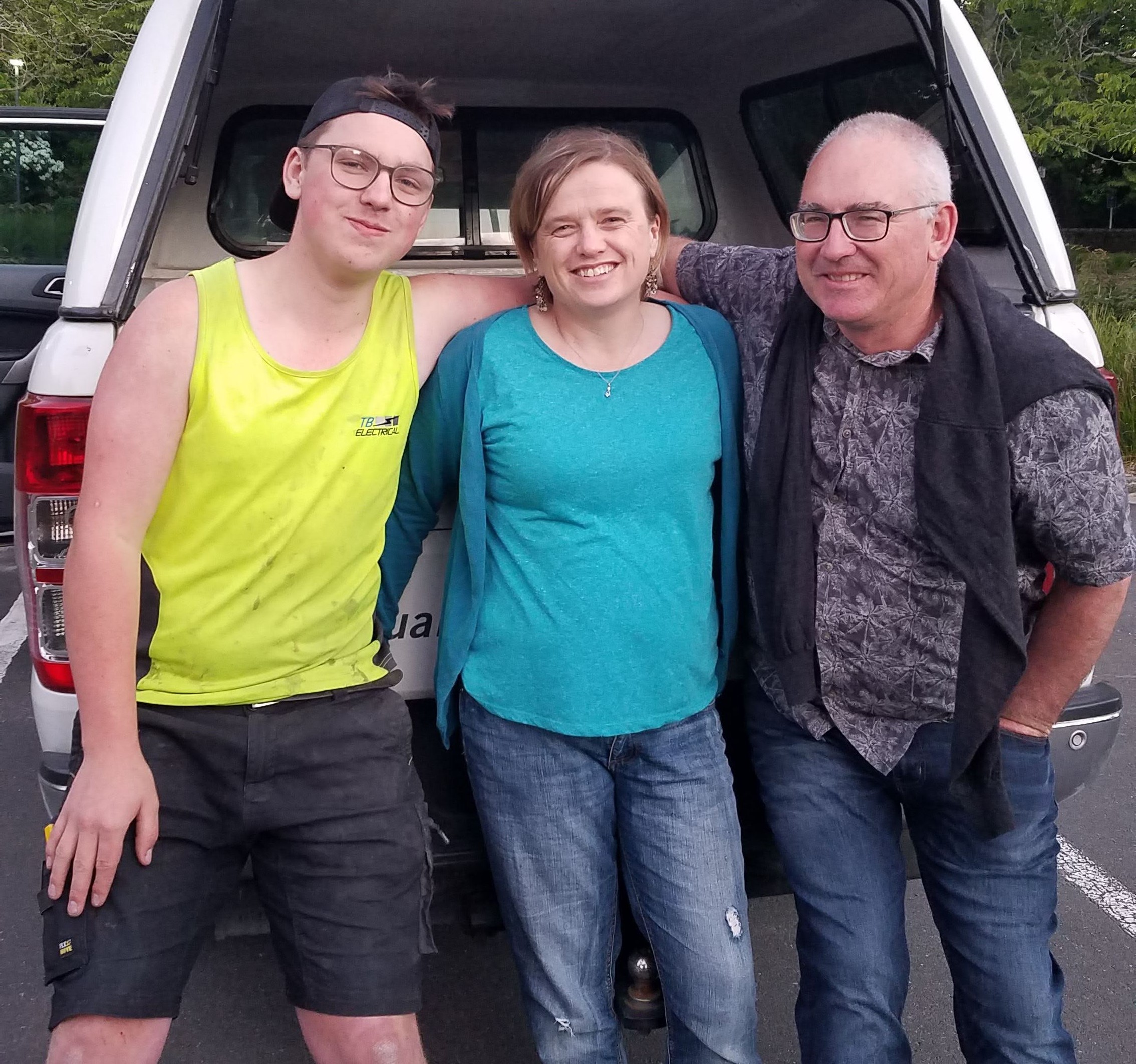
Ben, Catherine, and Philip
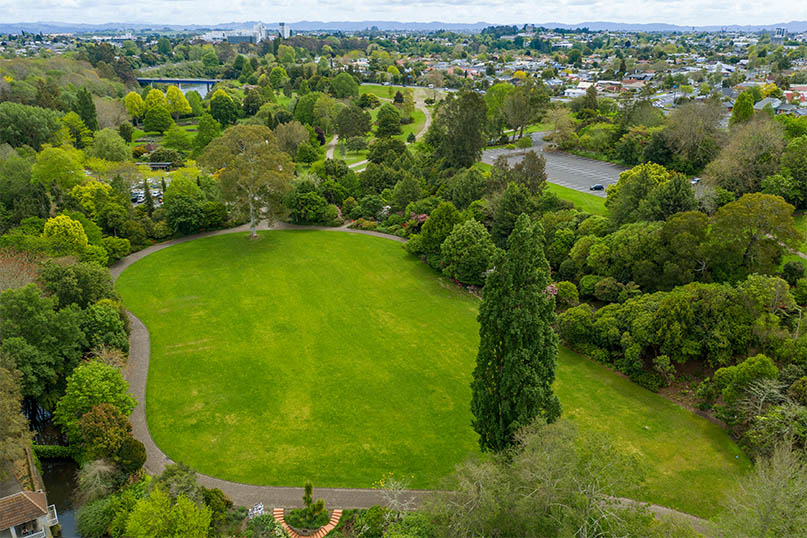
Rhododendron Lawn at Hamilton Gardens
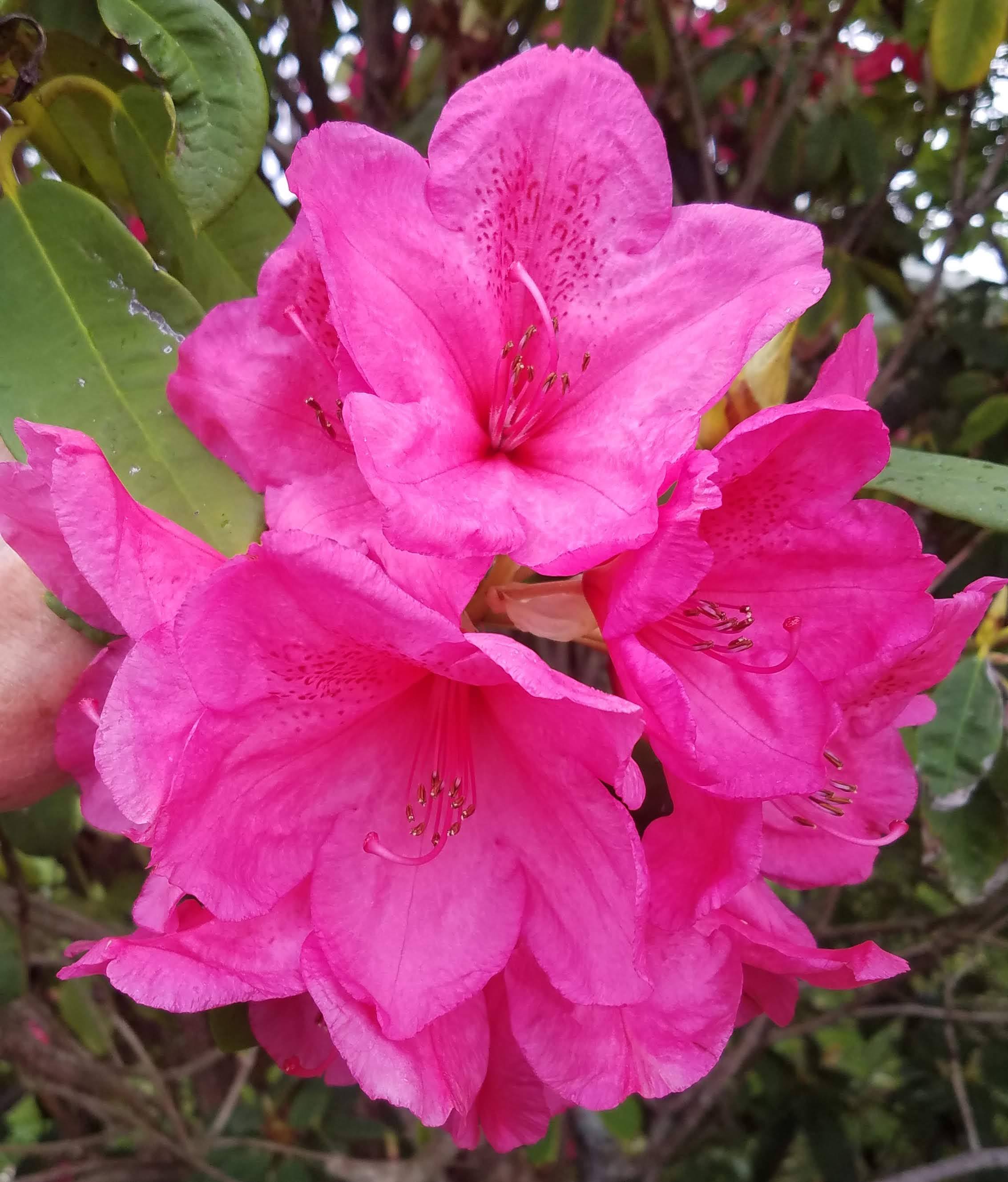
New Zealand’s rhododendrons are huge
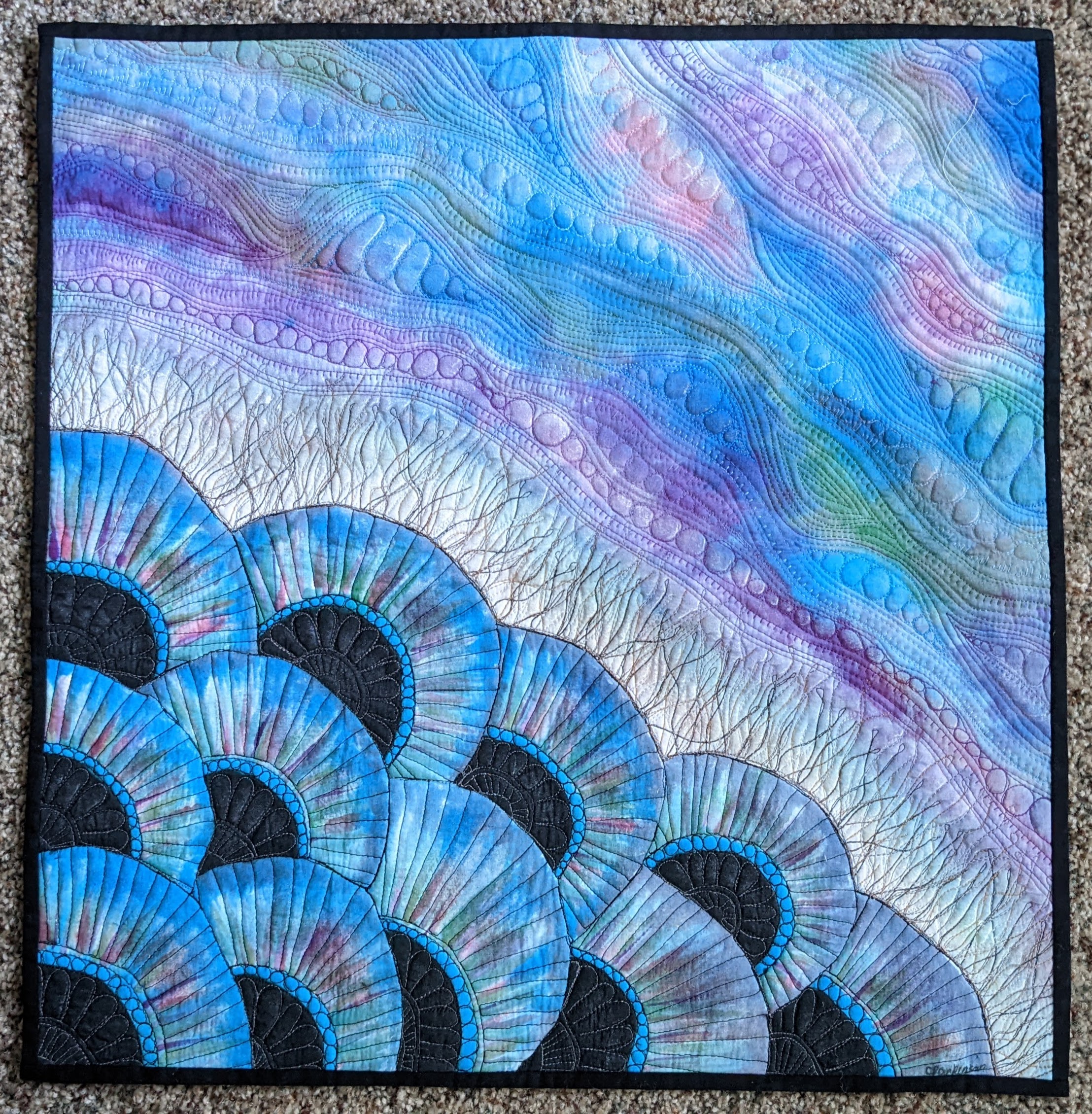
“Floating,” hand-dyed and quilted for us by Catherine
The first of these was a picnic at Hamilton Gardens with Catherine, the Matthew Cowley Pacific Church History Centre’s part-time archivist and conservator; her husband, Philip; their teenage son Ben; and Diane (our frequent companion). Working with Catherine at the MCPCHC had been a delight, and periodically getting together with her and her family at their old farmhouse on a narrow country road about 30km from Hamilton was even more delightful. As it happened, Philip had served in the Pennsylvania Philadelphia Mission as a young man and had spent several months assigned to a ward in our Delaware-area stake while we were living there, so although we had never met him during that time, we knew many of the people he had worked with and had fun sharing reminiscences. The evening of our farewell picnic we also enjoyed hearing Ben’s enthusiastic description of his day on the job as an apprentice electrician. We had spread our picnic blanket on Hamilton Gardens’ Rhododendron Lawn, which under normal circumstances might have been crowded with other picnickers on such a lovely evening in early spring; however, due to COVID, that night the space was nearly deserted. Most of the rhodies had bloomed a couple of weeks earlier and had dropped their blossoms, but a few splashes of brilliant magenta remained in the shrubs around the lawn.
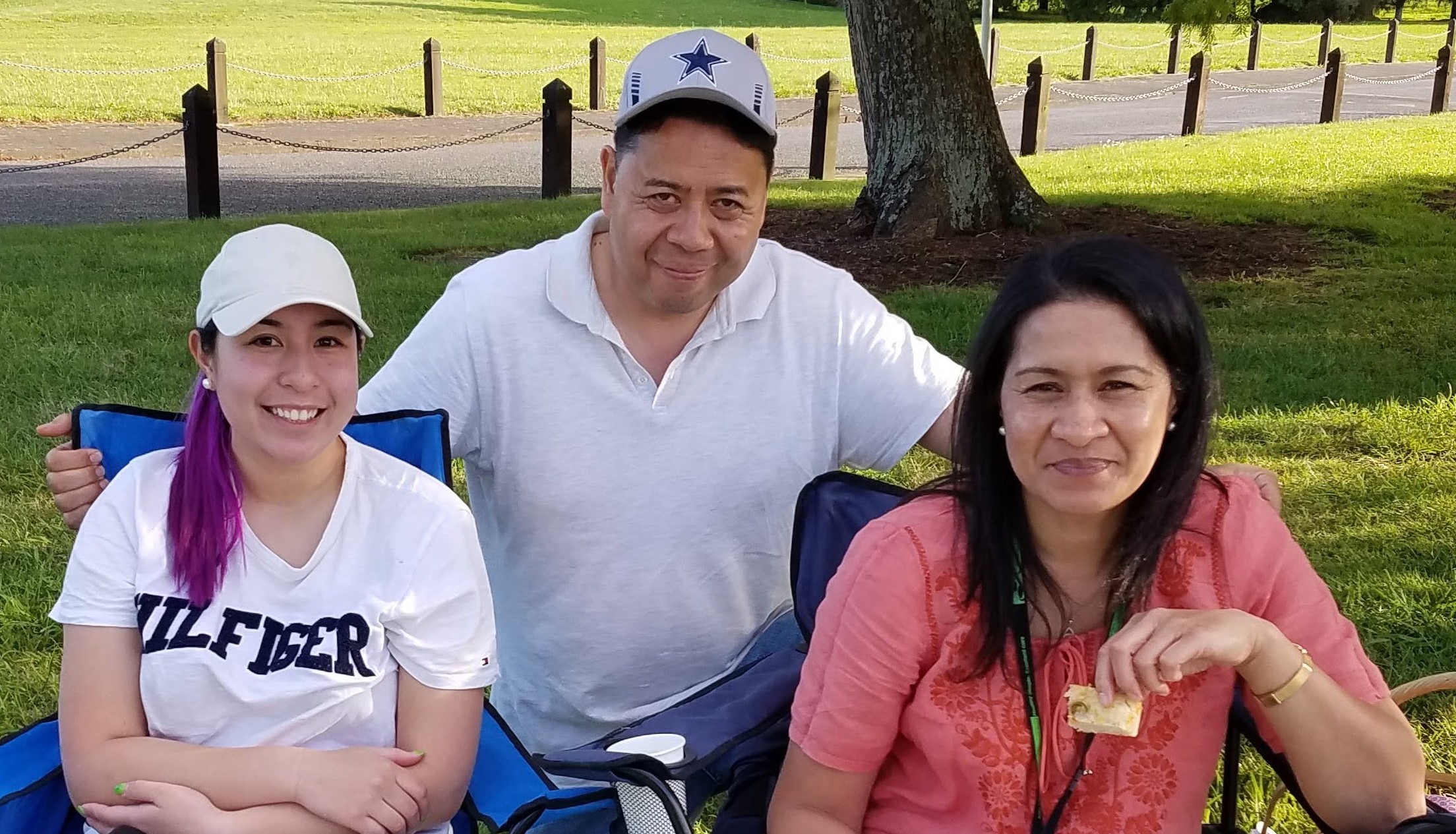
Bishop Jason K with wife Vae and daughter Elisa
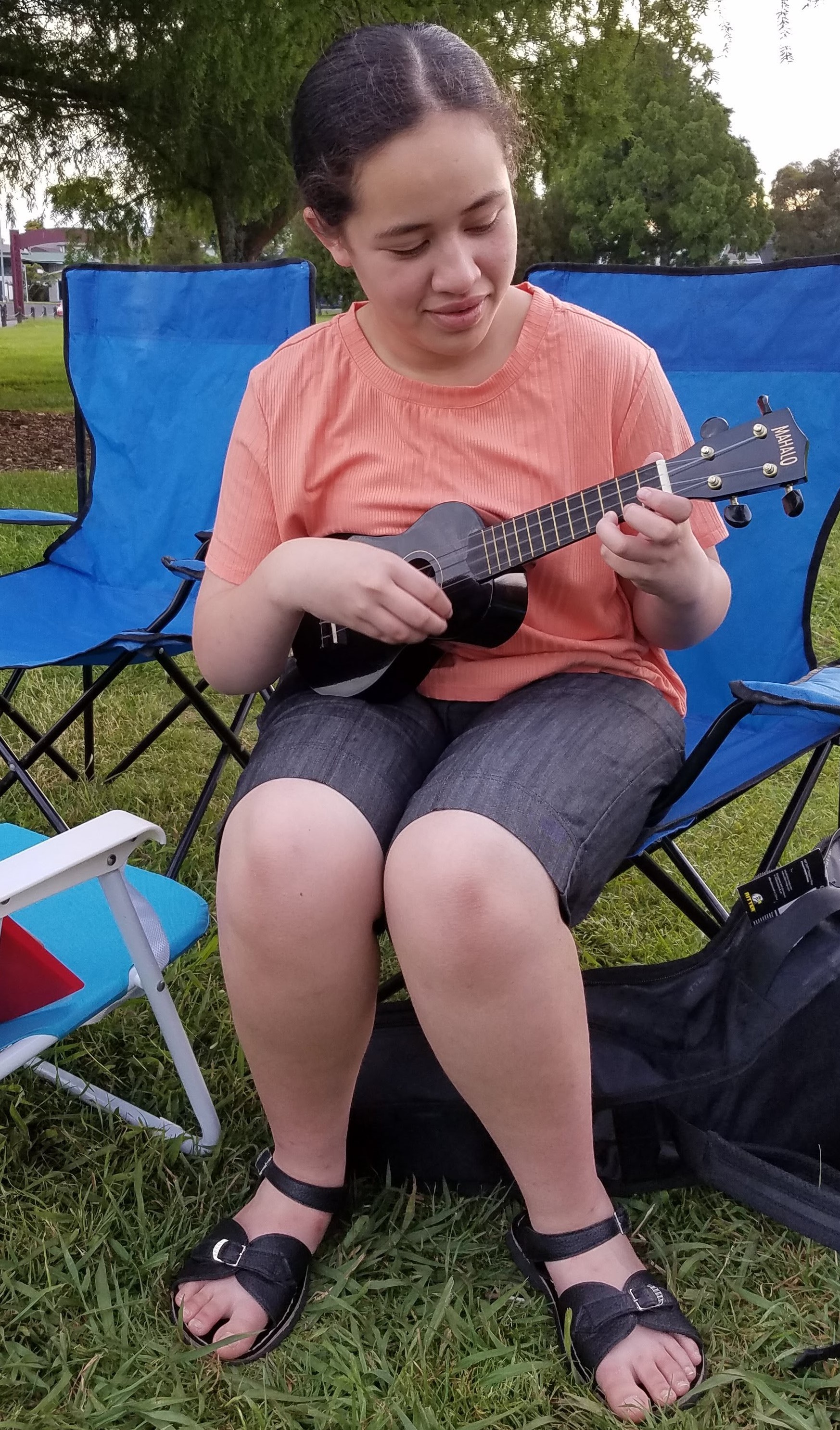
Melite not only plays ukulele but also dances beautifully
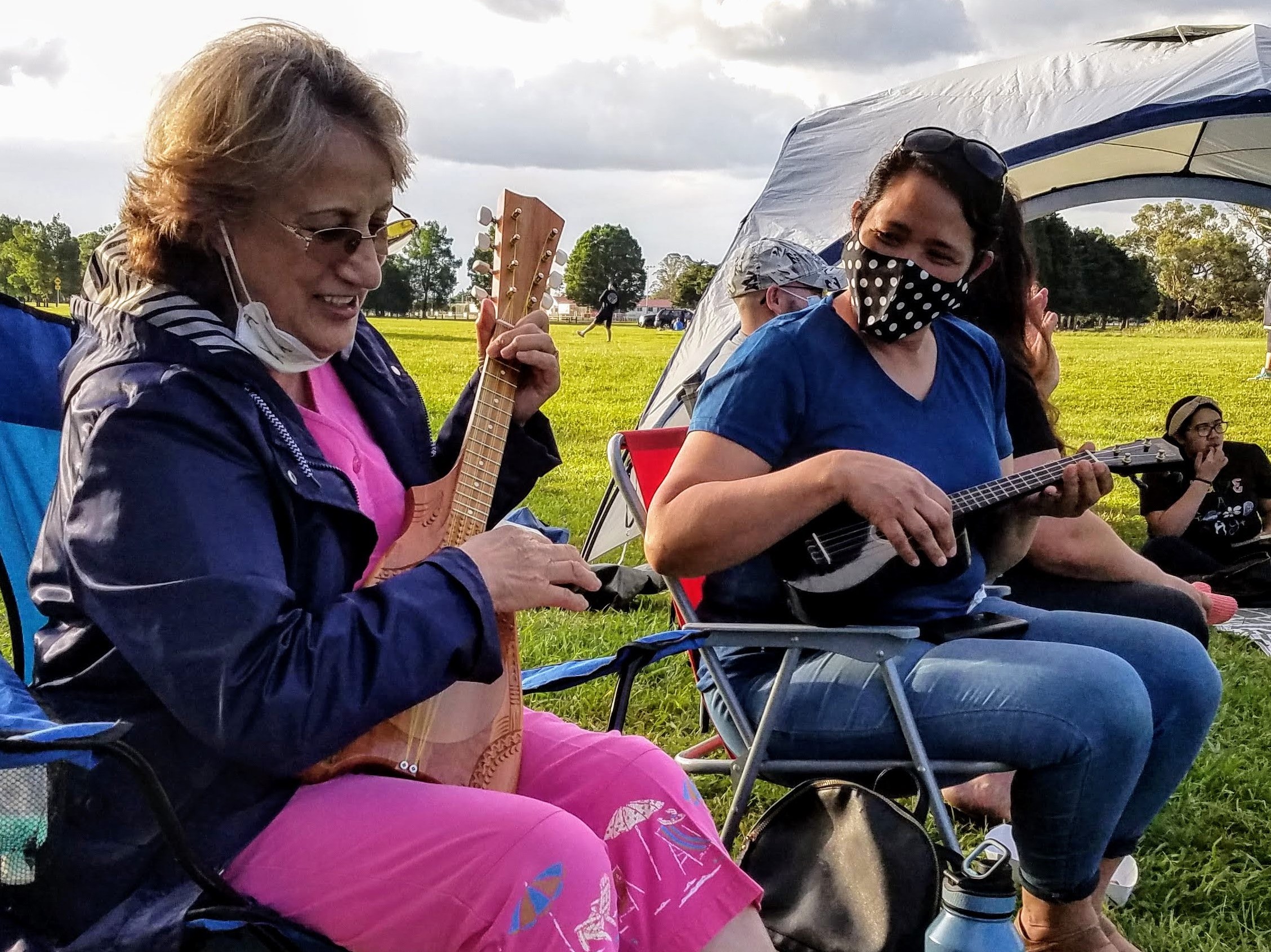
Karla and Meli playing Kiwi folk songs
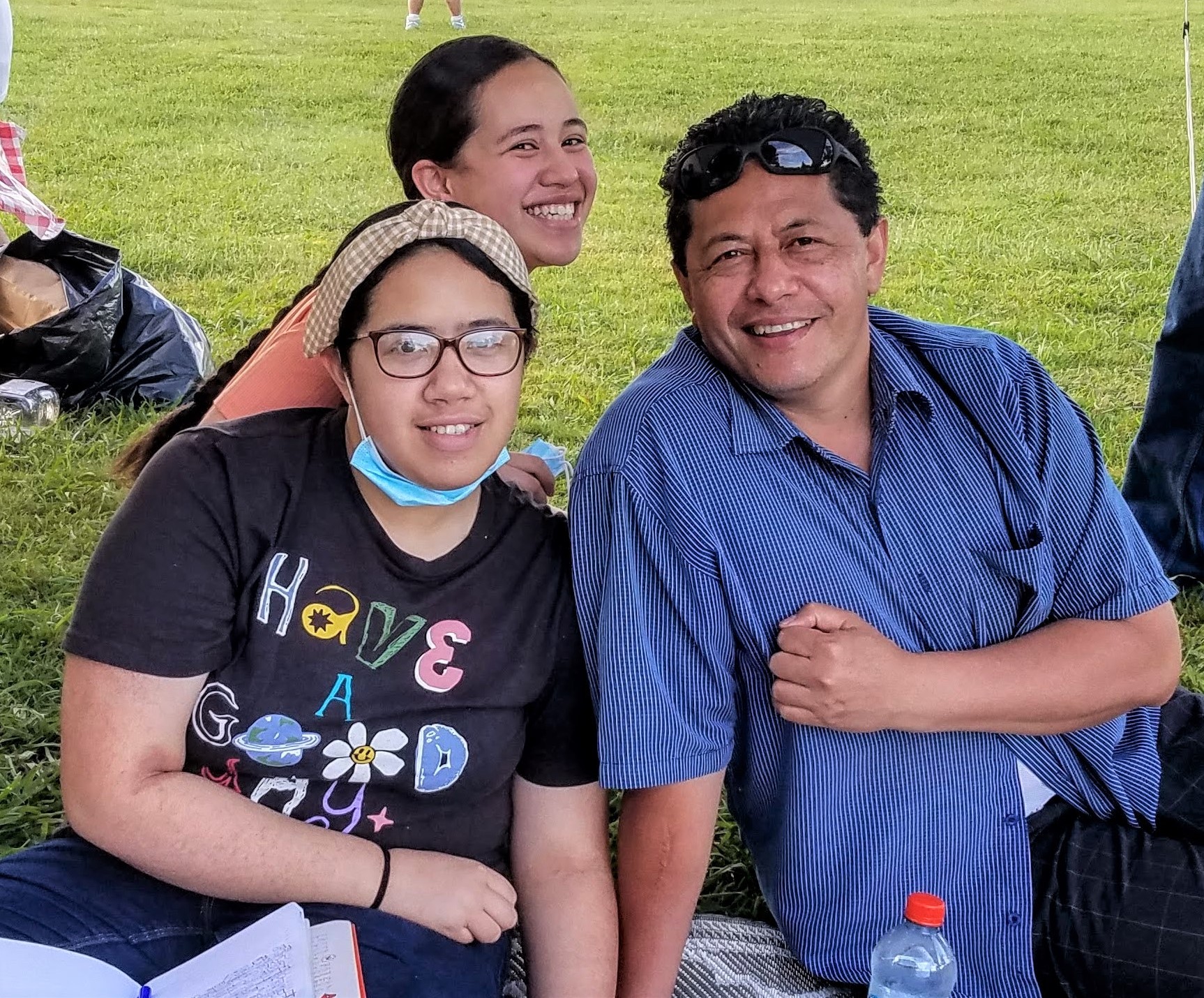
Fivarikah, Melite, and Terri
The next event was a potluck organized by the bishop of the Dinsdale Ward, and was held the following evening at Innes Common, a broad expanse of grass next to the Yacht Club at Lake Rotoroa (aka Hamilton Lake). Bishop Jason K had been the ward mission leader at the time we arrived in Hamilton, and he and his wife Vae had been quick to befriend us, frequently inviting us to join them for dinner or a musical performance. (We knew Jason was a true music lover because one of his first acts after being called as bishop was to ask Michael to reorganize and direct the ward choir; he followed up by becoming a faithful choir member himself.) Sadly, COVID limitations on public gatherings prevented the bishop from inviting the whole ward to our farewell picnic, but a few dozen members of the ward came, bearing platters of fried chicken, chips (aka french fries), meat pies, egg sandwiches, potato and kumara salads, fried rice, fruit, and dessert slices. (May blessings be showered upon the head of the person who brought a bowl of healthy, broccoli salad.) The more senior members of the group had a great time talking while the teens and young adults shot baskets and tossed a frisbee nearby, and later we attempted (not very successfully) to sing along with the Kiwi folk songs that Karla, Meli, and Melite were playing on their respective strummed, string instruments.
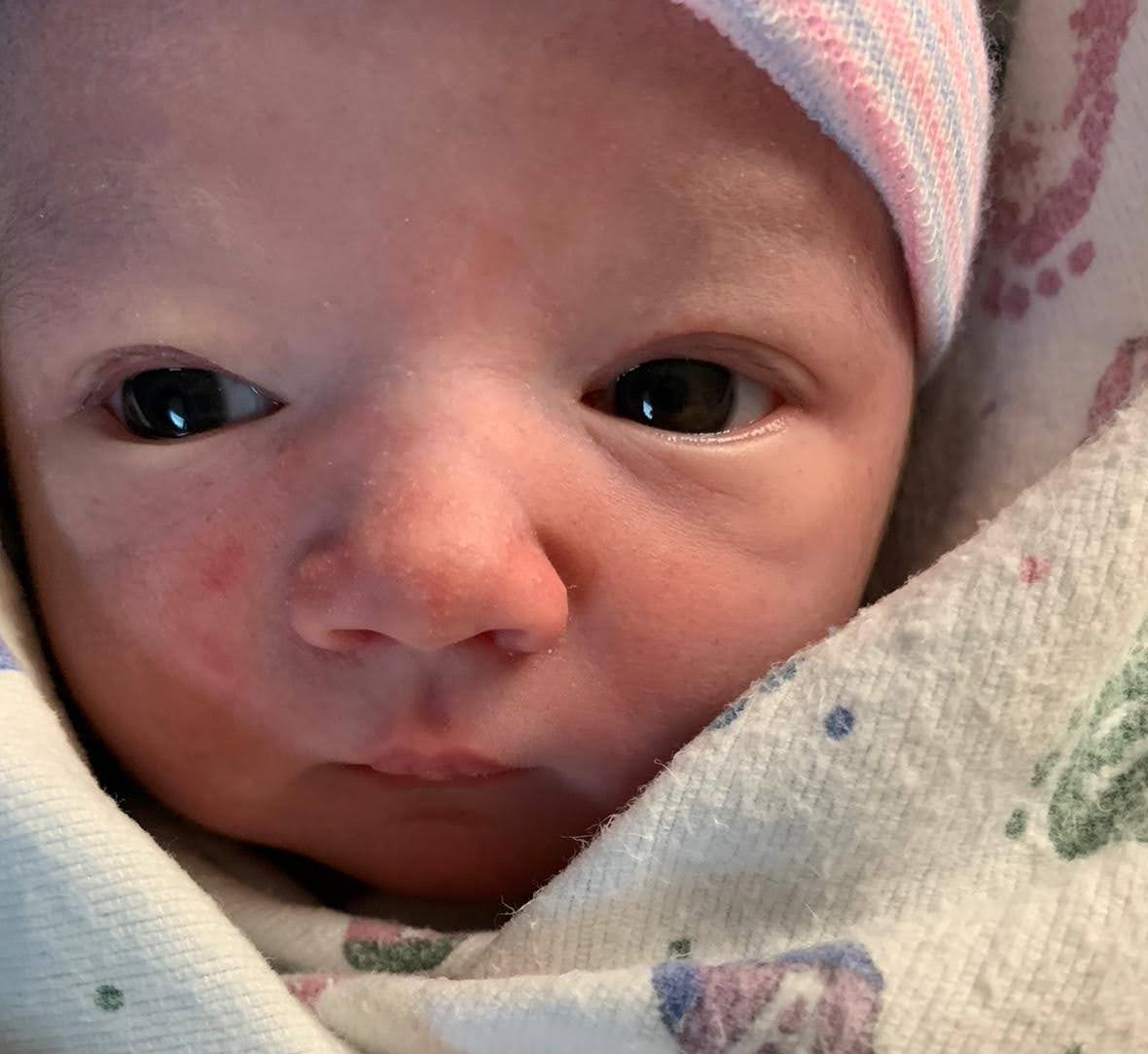
Archie, our newest grandson, born 19 November
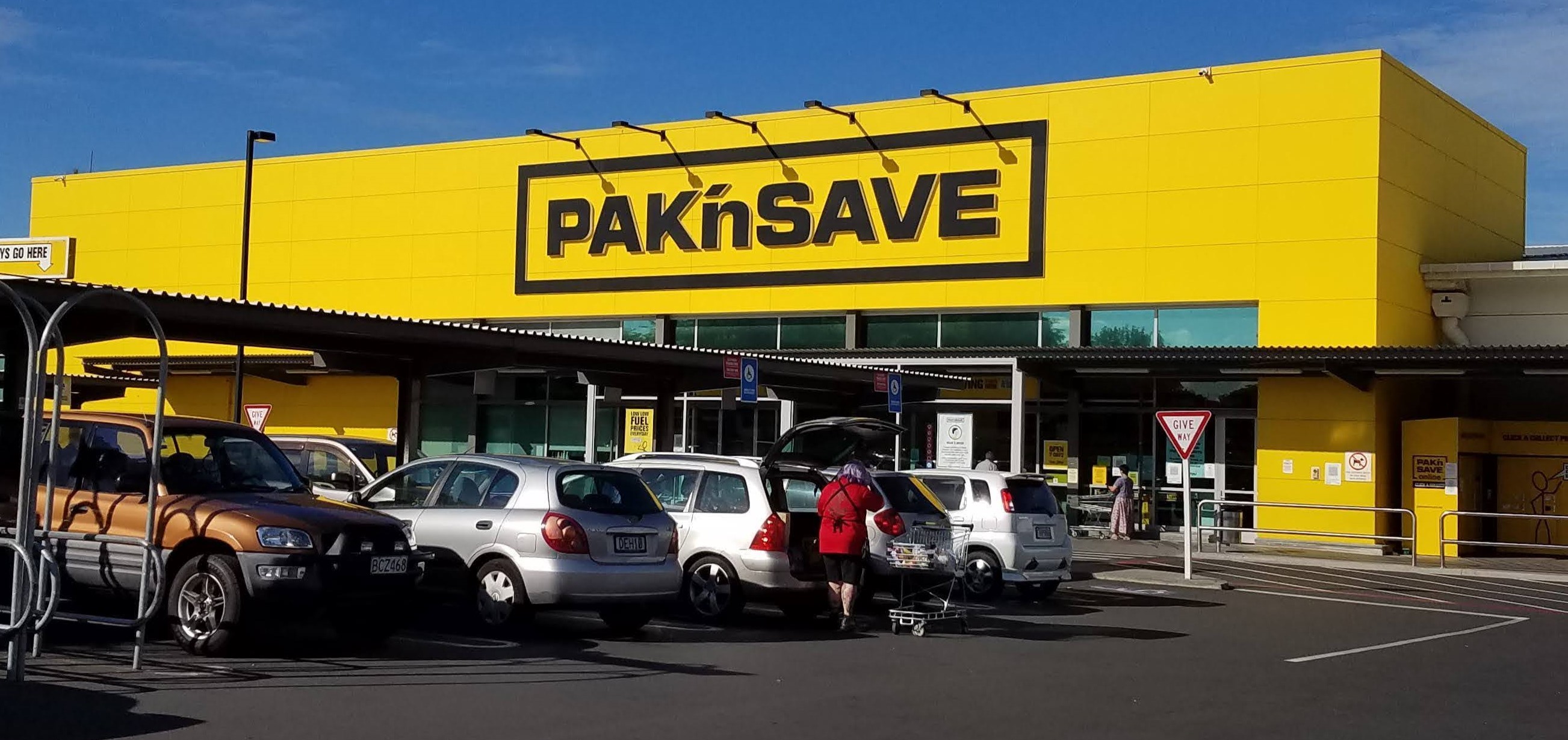
Pak ‘n Save on Clarence Street
Monday 22 November was our final “P-day” (a missionary’s weekly day off for “preparation”). We made our last trip to Pak ’N Save, where we bought only enough milk, fruit, and vegetables for the rest of the week, but were happy to have a chance to say goodbye to the friendly cashier whose checkout line we had gone through most often during our time in Hamilton. After we finished our household chores, we enjoyed two virtual chats: one with Nancy’s sisters, and the other with our children and grandchildren. The highlight of the latter was getting our first glimpse of Archie, the grandson who had been born in Salt Lake City only three days earlier.
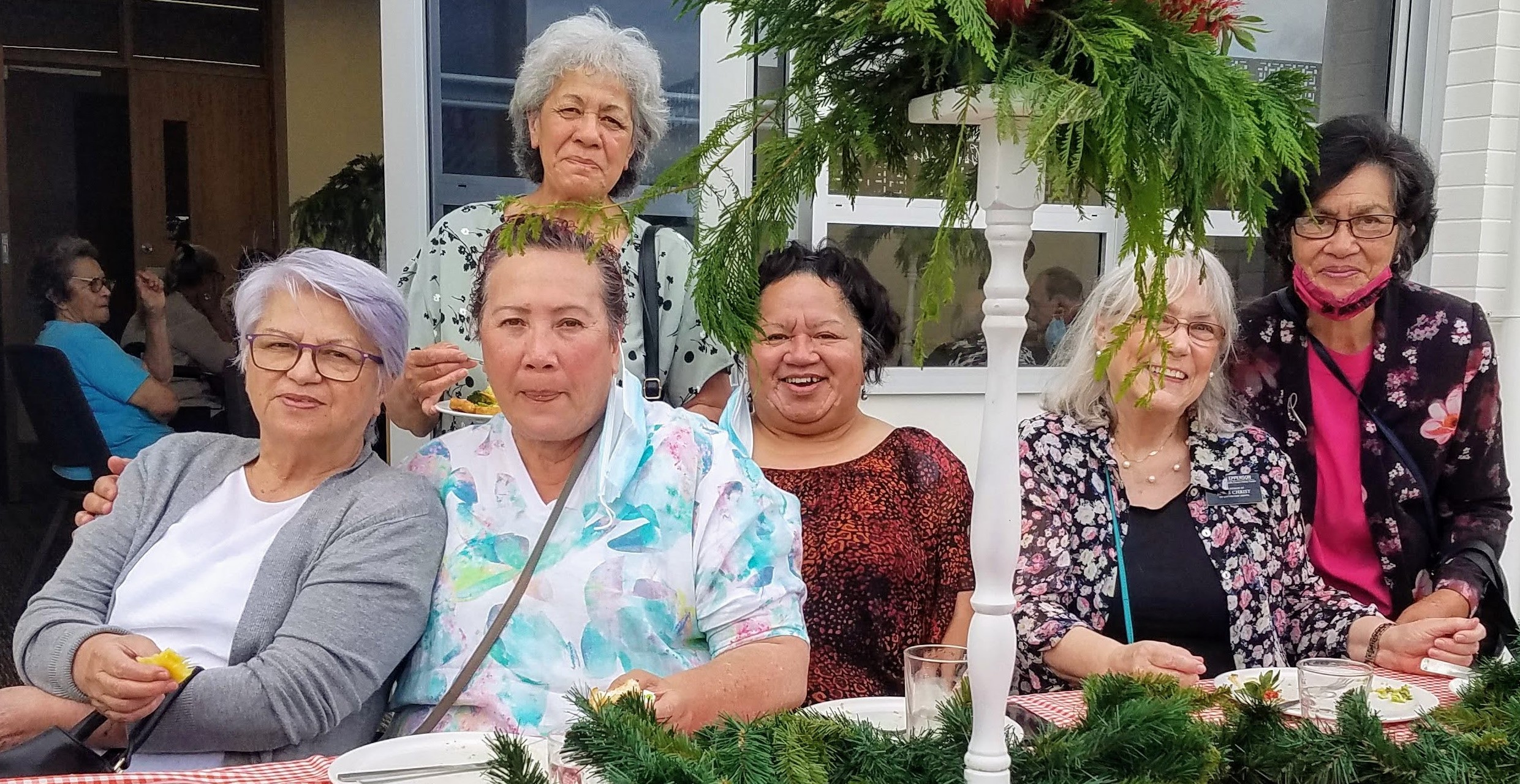
Some of the volunteer museum guides who gathered to bid us farewell: Raina (standing), Eva, Verna, Jacqui, Diane, and Lynda
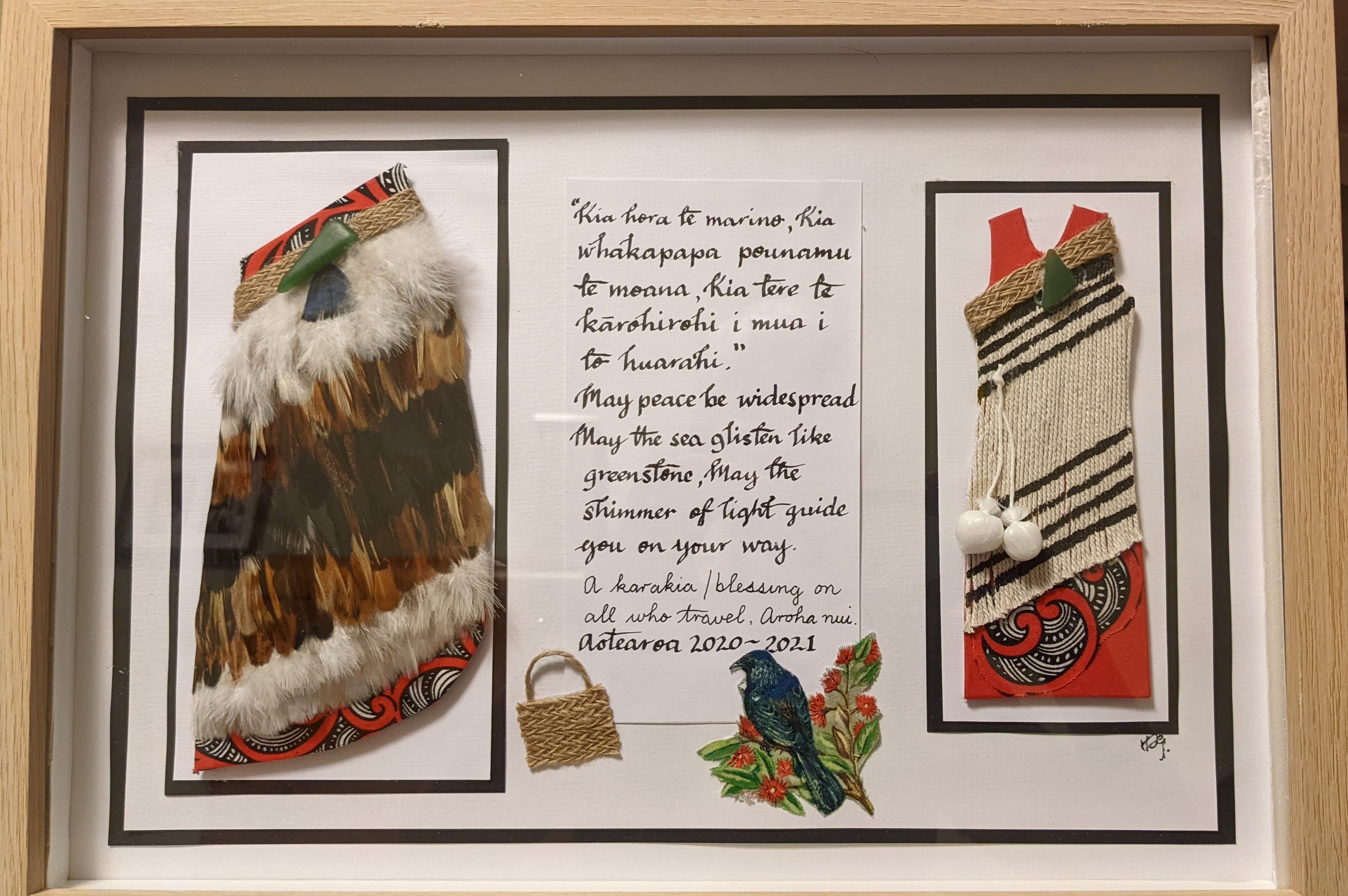
Our farewell gift from the MCPCHC staff: Māori artwork custom-made for Michael and Nancy by Elder and Sister G
As on every Monday, the MCPCHC had been closed all day, but Jo-Ena and Hori had been there most of the afternoon preparing to host the volunteer museum guides who were coming to bid us farewell. Jo-Ena’s friend Paula—Hamilton’s equivalent of Martha Stewart—had decorated the lunch room as if for Christmas, which seemed strange to us Americans not only because the day was sunny and warm and the roses outside were in full bloom, but also because pumpkins and cornucopia would have seemed more appropriate since it was only a few days before Thanksgiving. But it was fun to feel festive, sing Christmas carols, and sample a lot of good food, including a delectable pavlova and the largest bowl of cream paua (abalone) we’d ever seen (Hori’s contribution). More important: it was so wonderful to be greeted by our beloved volunteer guides! We hadn’t seen any of them since we had to close the museum in mid-August, and as we took the opportunity to talk with them again, Nancy was overwhelmed by how much she had come to appreciate the friendship of each of those loving, generous, faithful people. Although we tried to abide by then-applicable COVID rules for public gatherings—limiting attendance to under 30, wearing masks, seating most guests on the patio outside the lunch room and keeping the doors open for ventilation—by the end of the evening we had abandoned elbow-bumping and instead were exchanging long hugs and hongis. COVID notwithstanding, “sharing breath” with a hongi just seemed the right thing to do, considering that we probably would not see most of these people again until the resurrection.
Below: George, a museum volunteer, picks out “Jingle Bells” on the guitar. We find it curious that this American Christmas classic is as popular in New Zealand as it is, because there is never any snow to dash through at Christmastime.
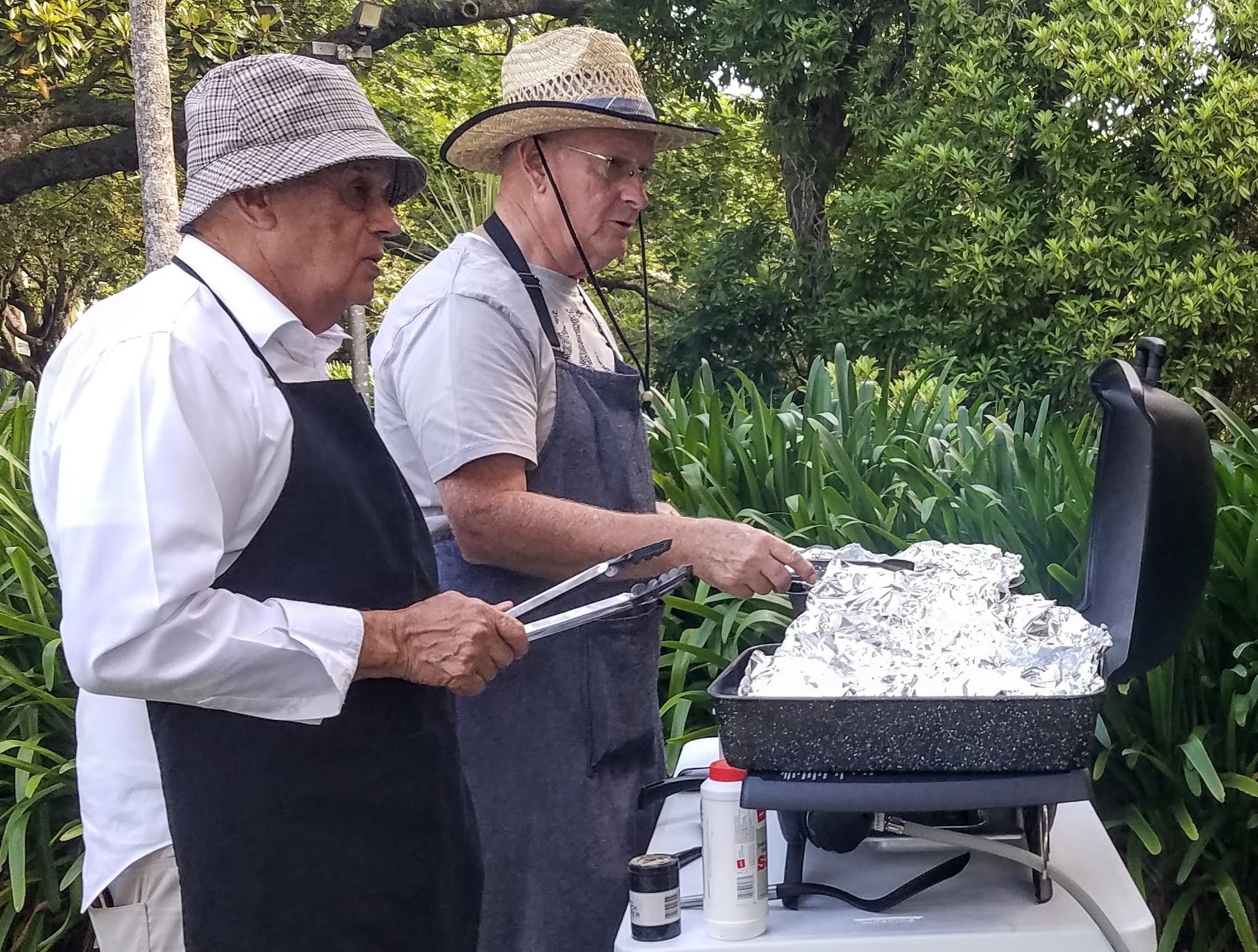
Ken and Mike R man the barbie
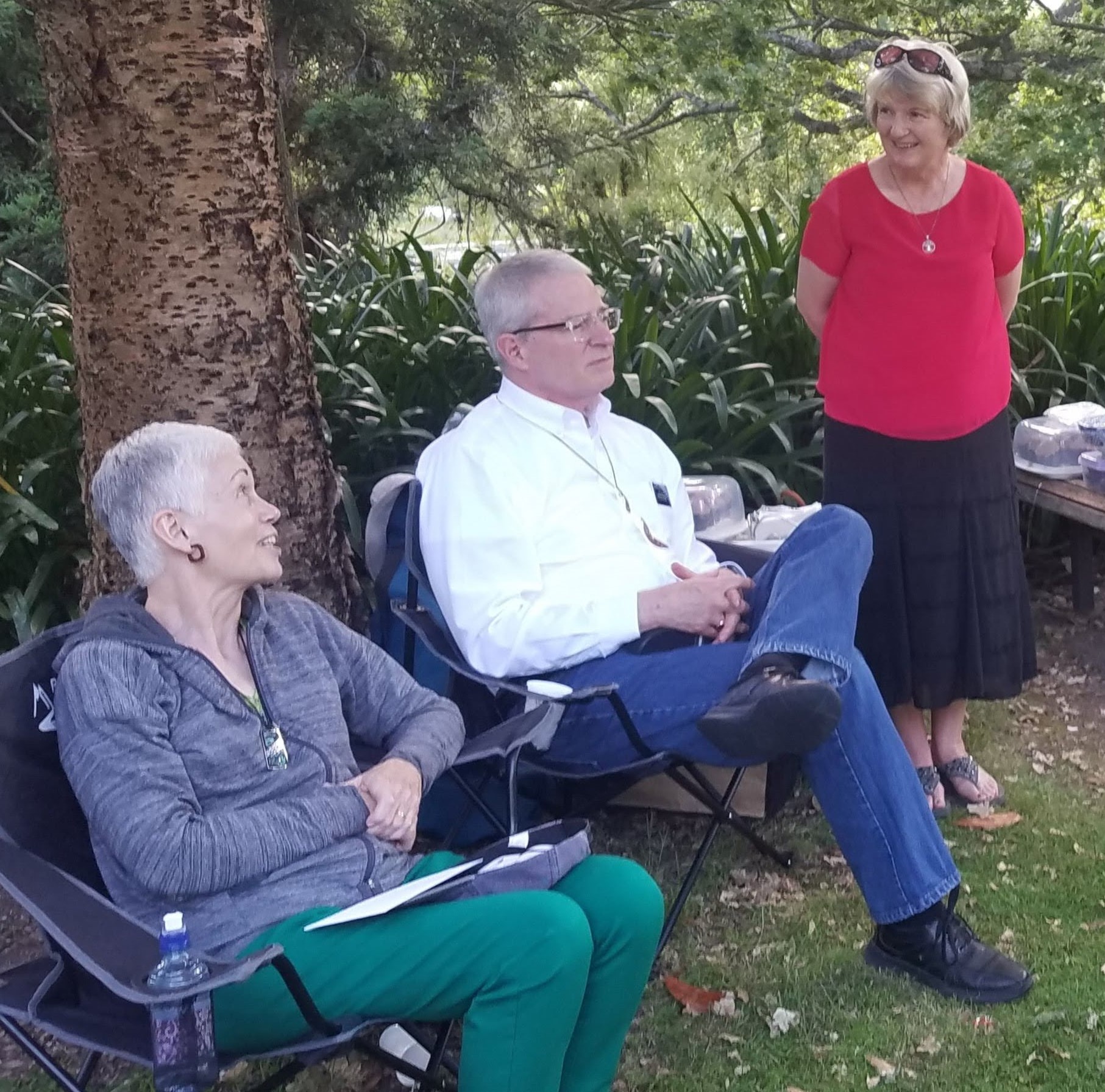
Christine interviews Nancy and Michael
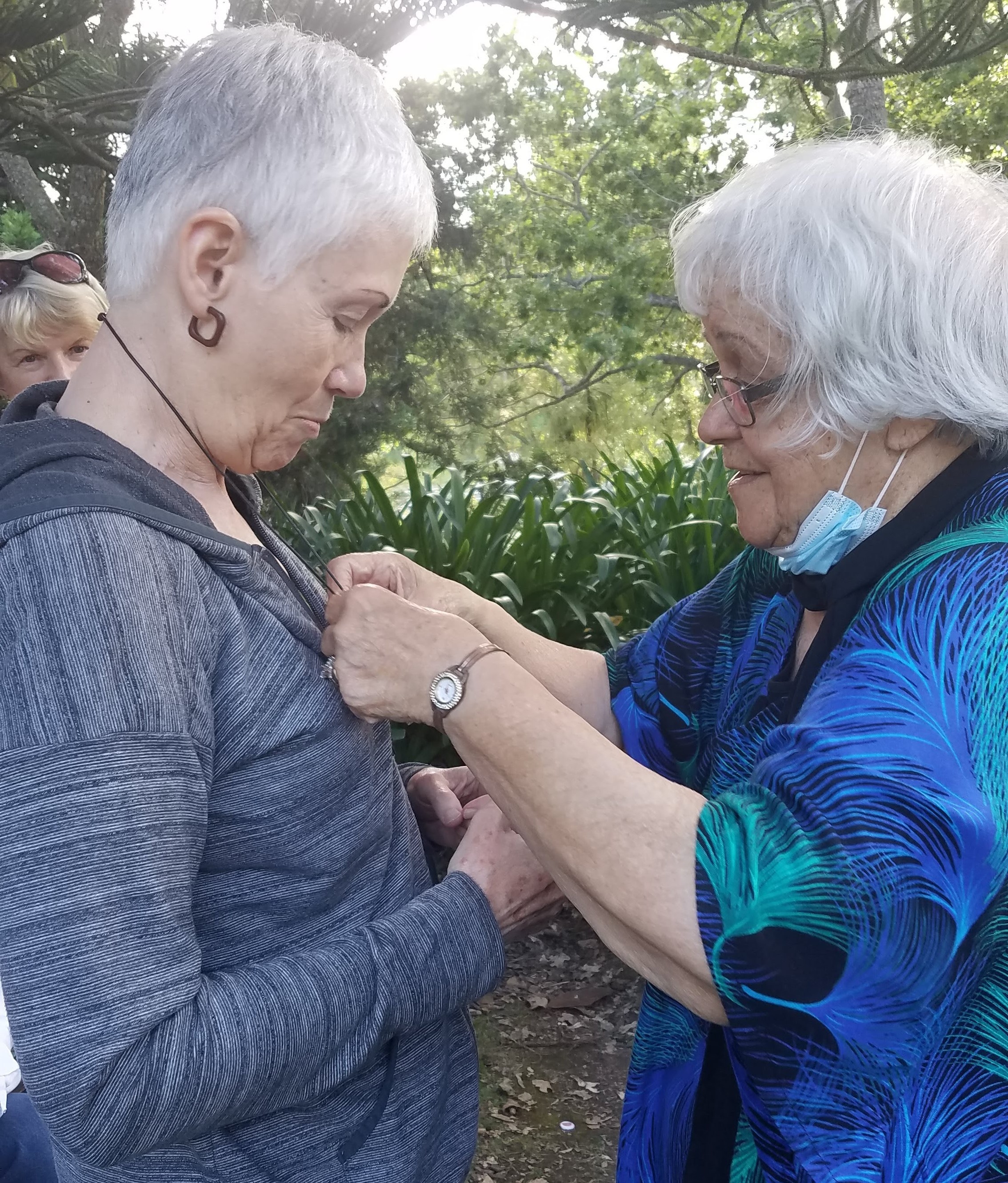
Rangi presents Nancy with a paua-shell necklace
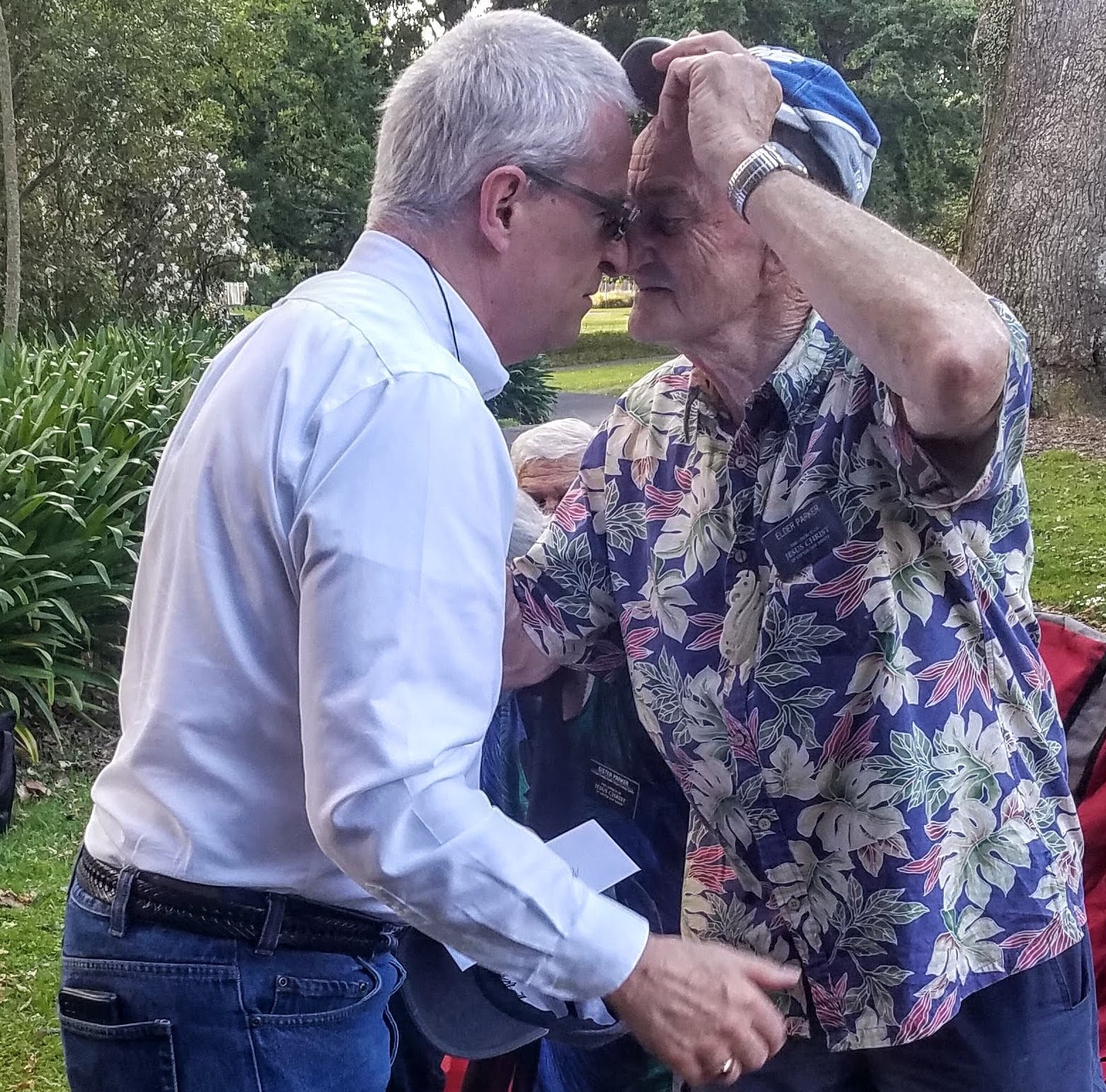
After Vic presents Michael with a carved whalebone pendant, they hongi (“share breath”)
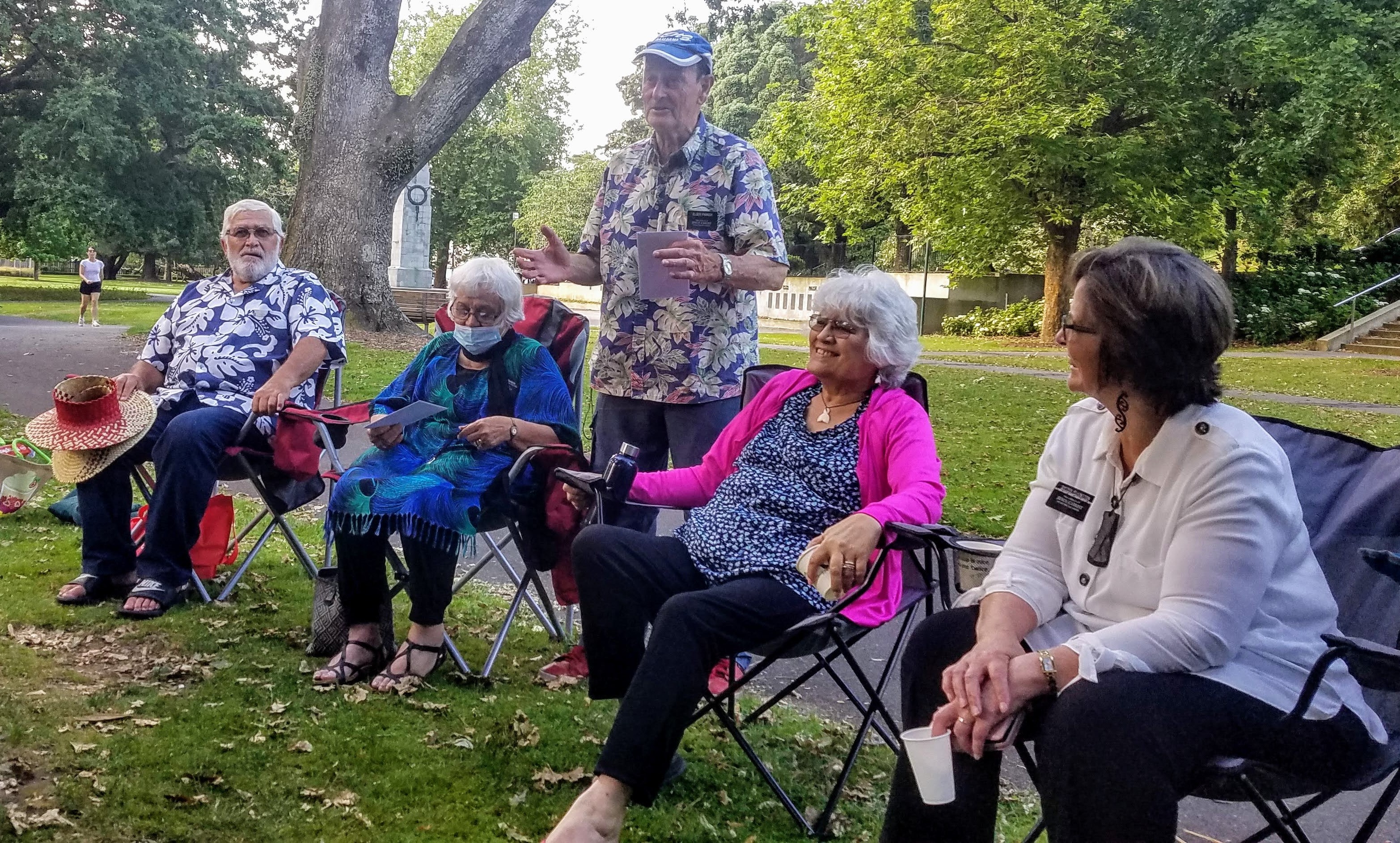
Koro, Rangi, Vic, Virginia, and Jo-Ena enjoy the beautiful evening
After work on Tuesday 23 November, the MCPCHC’s full-time missionary staff, along with our part-time service missionaries, the manager of the Church Distribution Center, and the president and matron of the Hamilton Temple (who often join our senior-missionary gatherings), met at Memorial Park in central Hamilton for a farewell cookout. Ken, who joined the MCPCHC staff earlier this year as a part-time acquisitions specialist, manned the barbie, with assistance from Mike R, the temple president, while Marilyn and Christine, their respective wives, helped Jo-Ena set an array of side dishes on the serving table. The weather could not have been lovelier, nor could the spirit that enveloped the group as we ate, talked, and laughed together. Most of these people we knew very well after working closely with them for many months, but a few of the part-timers were fairly new additions to the MCPCHC. Christine had planned some activities that required everyone to reveal some little-known information about ourselves—some of it significant, some of it silly—so we had fun getting acquainted with the new folks and even better acquainted with the people we now regard as whanau (extended family). We who were about to finish our missionary service (including Diane, whose flight back to the US was scheduled the day after ours) were each presented with some wearable taonga (treasures): traditional Māori necklaces carved from whalebone, paua, and greenstone. We’ve often admired the jewelry hanging around others’ necks, but by Māori tradition, one does not select one’s own taonga—it must be given to you. That our beautiful Māori jewelry was chosen for us by these dear friends makes it even more precious.

Jo-Ena, Vic, Rangi, and Michael are thankful for each other
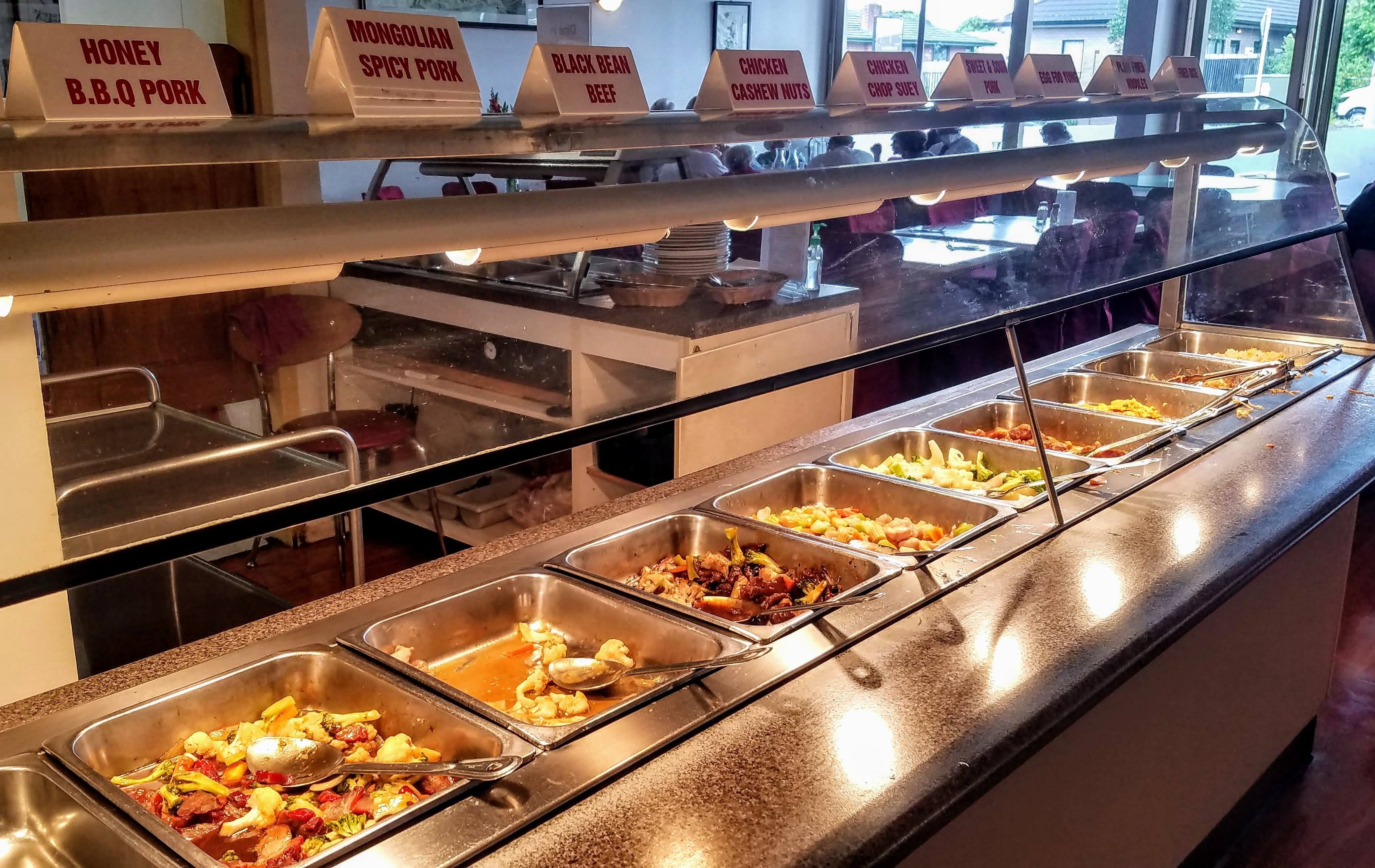
Food a-plenty at the Golden Dragon
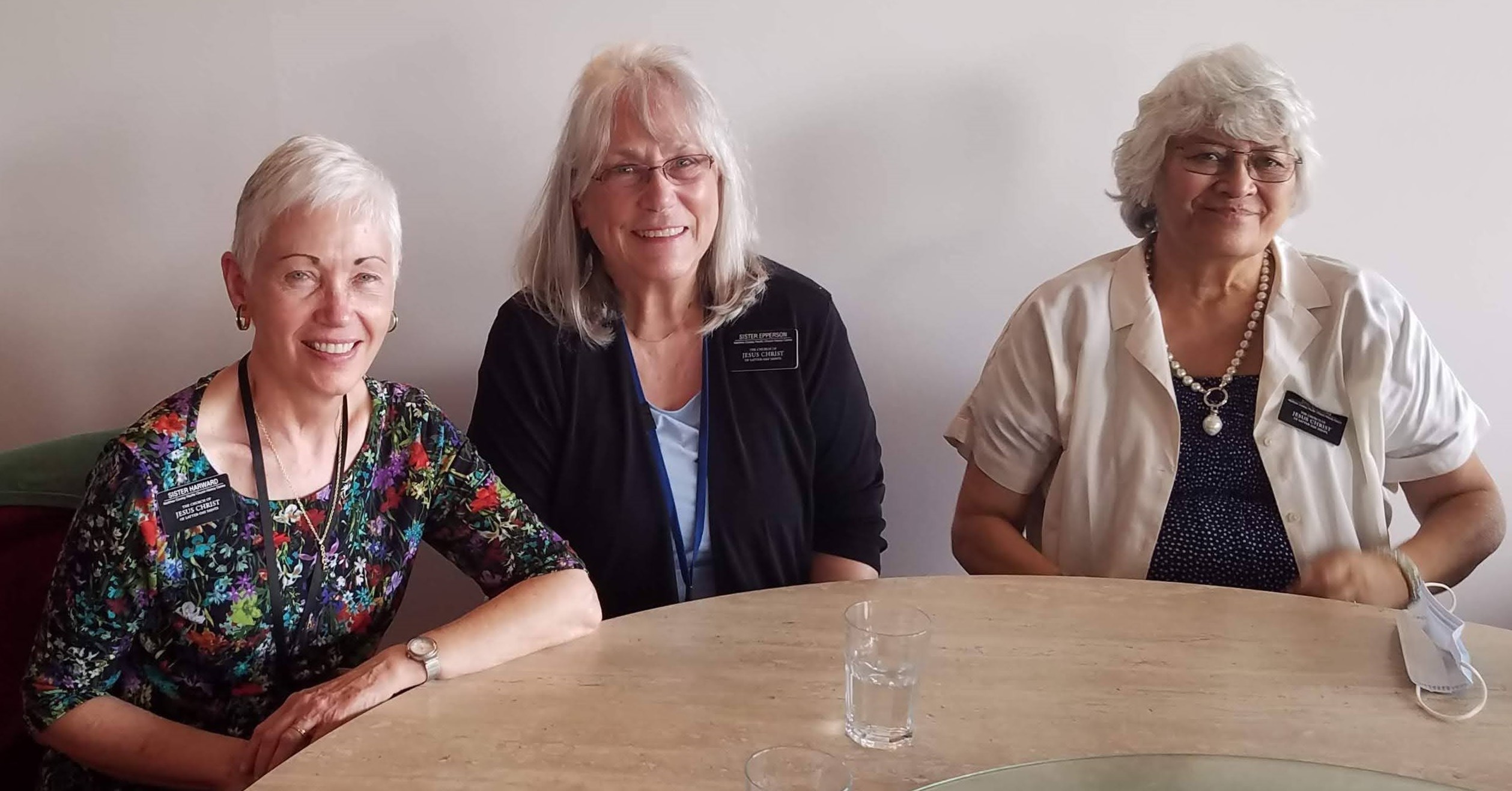
Nancy, Diane, and Virginia enjoy each other’s Thanksgiving company
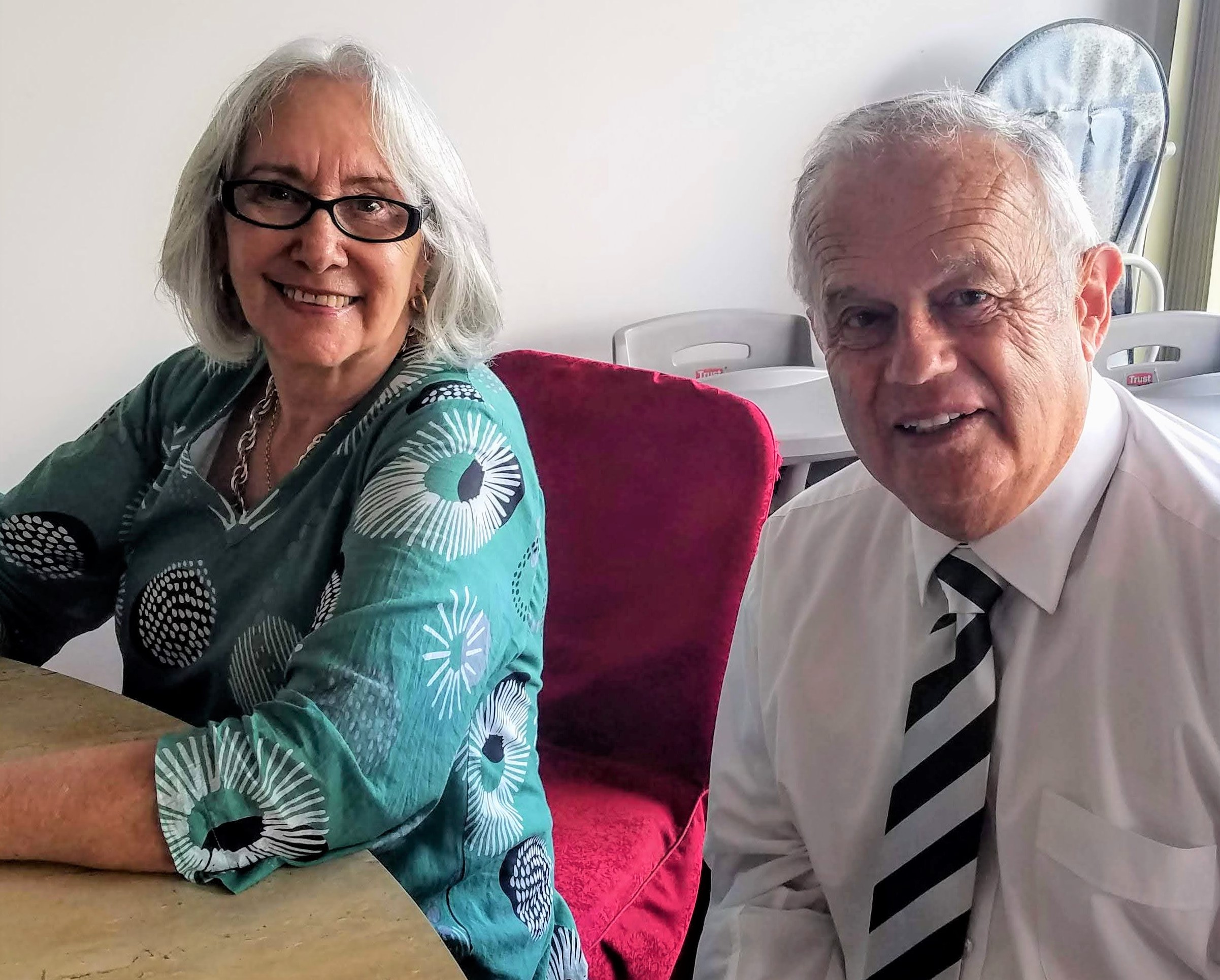
Marilyn and Ken are part-time service missionaries who joined the Church History staff a few months ago. We are thankful for them not only because they have worked hard to learn arcane acquisitions protocols, but also because they make us laugh
On the American calendar, Thursday 25 November was Thanksgiving Day. Months ago, we had planned to celebrate by going to Auckland for a holiday feast with Barry, Eva, Jeff, Kara, and the rest of the American missionary cohort. Alas, Auckland—and our friends who lived there—were still off-limits to us due to COVID restrictions, and in Hamilton, Thursday 25 November was just another work day. But although we spent most of the day at the MCPCHC, Elder and Sister E found ways to make it a memorable occasion for us. As if we hadn’t already had enough farewell parties, they planned yet another one: lunch with the whole MCPCHC staff at the Golden Dragon, a Chinese all-you-can-eat buffet whose chief asset is a big round table that can seat ten. (Twelve of us came, so Helena and Sheryl, the part-timers with the least seniority, had to sit at an adjacent table, but efforts were made to include them in the general conversation.) Ordinary Chinese fare wasn’t exactly what we would have chosen for our Thanksgiving feast, but at least the food at the Golden Dragon was appropriately plentiful. Chances are we would not have been able to enjoy roast turkey even if we had gotten together with our American friends because the big birds are hard to find in New Zealand and very expensive. Putting sweet potatoes and pumpkin pie on the menu would not have been a problem, however.
Later that afternoon, after the group returned to the office, Elder E invited everyone into the theatre and announced that he had decided that before Elder and Sister H (Michael and Nancy) and Sister E (Diane) left New Zealand, they should have a chance to preview Building for Eternity, the documentary film about the construction of the Hamilton New Zealand Temple. This was a surprise, because only the day before Hori had told us that although he had received the video file from the Church’s Publishing Services Department (exciting news!) he didn’t think it would be appropriate to show it to anyone—not even those of us who had spent many months working closely with its producers—because it had not yet been approved for release. We’re not sure what motivated Elder E to change his mind, but we’re glad he did, because it was great to be able to watch Building for Eternity on a big screen, and especially to be able to share the experience with the other Church History missionaries—none of whom had seen more than bits and pieces of the raw footage from which the film was assembled. Everyone loved it, and the tissue box that was passed around during the showing was nearly empty by the end. Nancy seemed to be the only viewer whose eyes remained dry. “I’ve seen so many in-progress iterations of this so many times that it doesn’t make me cry anymore,” she explained. “Besides, this time through I couldn’t help noticing the flaws that still need to be corrected. The clip from Ray Park’s interview needs an identifying super, and that picture representing Paora Potangaroa’s grave needs to be cut because it’s definitely not Paora Potangaroa’s grave.” (If you haven’t seen it yet, you can watch the final version of the 46-minute film here. Be sure you have a tissue box handy.)
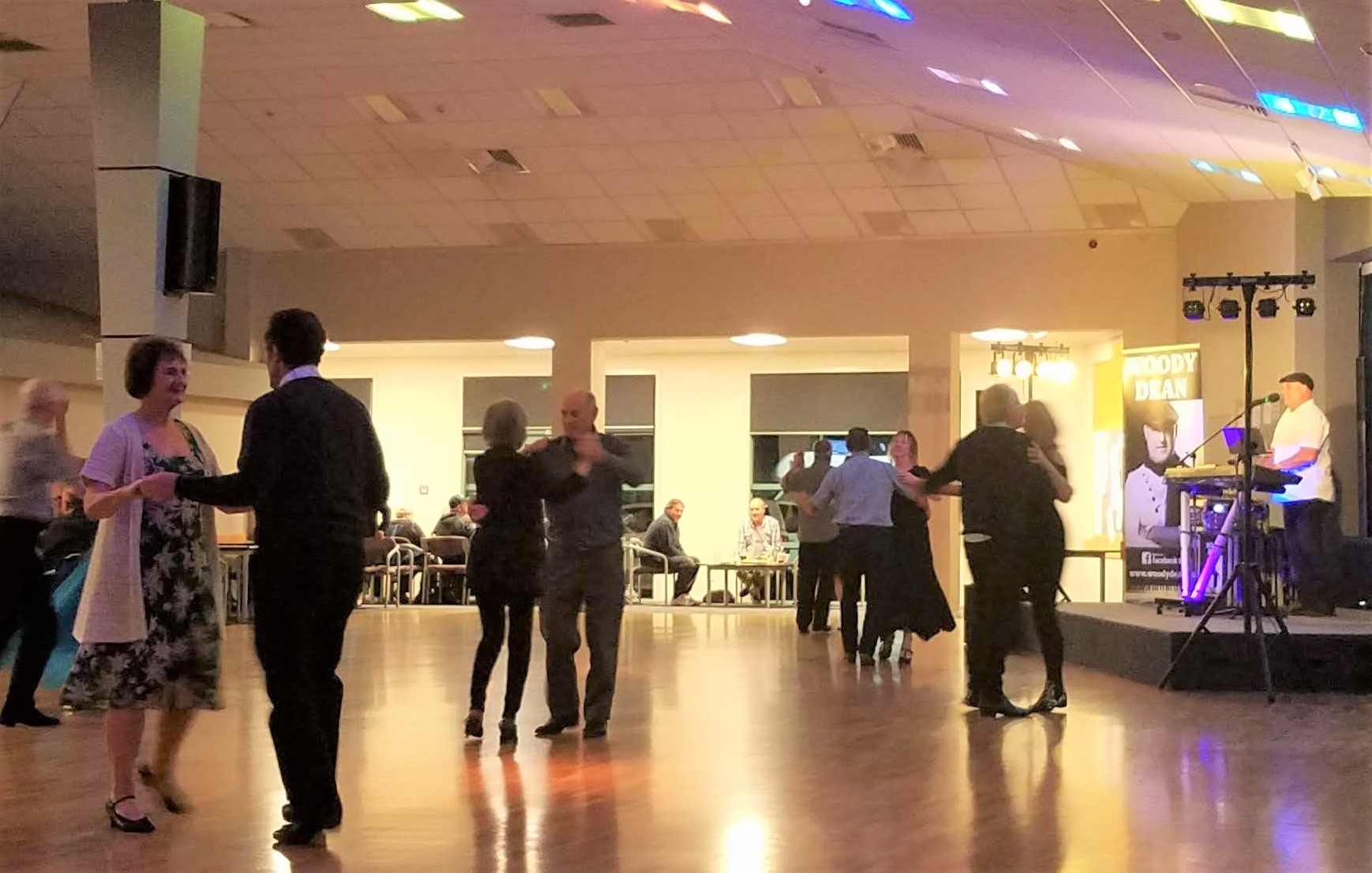
Dancing at the Hamilton Workingmen’s Club
That evening Karla, a widowed ward member who lives in our neighborhood, came over to pick up an item we couldn’t take to the States with us even though we really wanted to: Michael’s sourdough starter. Dozens of families have been the recipients of Elder H’s sourdough loaves since he began baking them regularly more than a year and a half ago, and everyone agrees that they are delicious! Karla was excited to take over the care and feeding of the starter, and we were happy to have one more opportunity to talk with a woman who has been a generous, helpful friend throughout our stay in New Zealand. Karla loves music and has frequently invited us over to sing, play games, and share a meal with her. Back in June, she also invited us to join her at a dance at the Hamilton Workingmen’s Club, where we were blown away by the skill and grace of the other ballroom dancers on the floor. We wish COVID closures had not prevented us from going back to the HWC with Karla on another Friday night because we had so much fun watching other couples—and practicing our own dance moves.
Friday 26 November was our last day at work at the Matthew Cowley Pacific Church History Centre. We cleaned out our desks, copied the digital files we wanted to save to a thumb drive that we could take home with us, then deleted all our personal stuff from the Church-owned computers we’d been using since January 2020 and transferred them over to Ken and Marilyn. We went home about 12:30, ate lunch, and then packed up to leave for a weekend of sightseeing in Taranaki, a region in the southwestern part of the North Island that we had not yet visited. Details of that trip will be contained in another blogpost; in the meantime, we’ll continue the saga of saying goodbye.
Back in Hamilton on Monday 29 November, it was time to prepare in earnest for our imminent departure from New Zealand. First on the day’s agenda was a trip to Pathlab in the Central Business District for the COVID tests we would need to board an airplane two days hence. We had been warned that such tests were uncomfortable at best and painfully disgusting at worst, so we were relieved that ours fell within the “uncomfortable” range. Both of us experienced watery eyes when our nasal passages were swabbed, but the technician pronounced that “good,” explaining that eye-watering was one indication that she had swabbed in the right place. It was also a relief to get in and out of the lab within half an hour—albeit without any assurance that our tests would be negative.
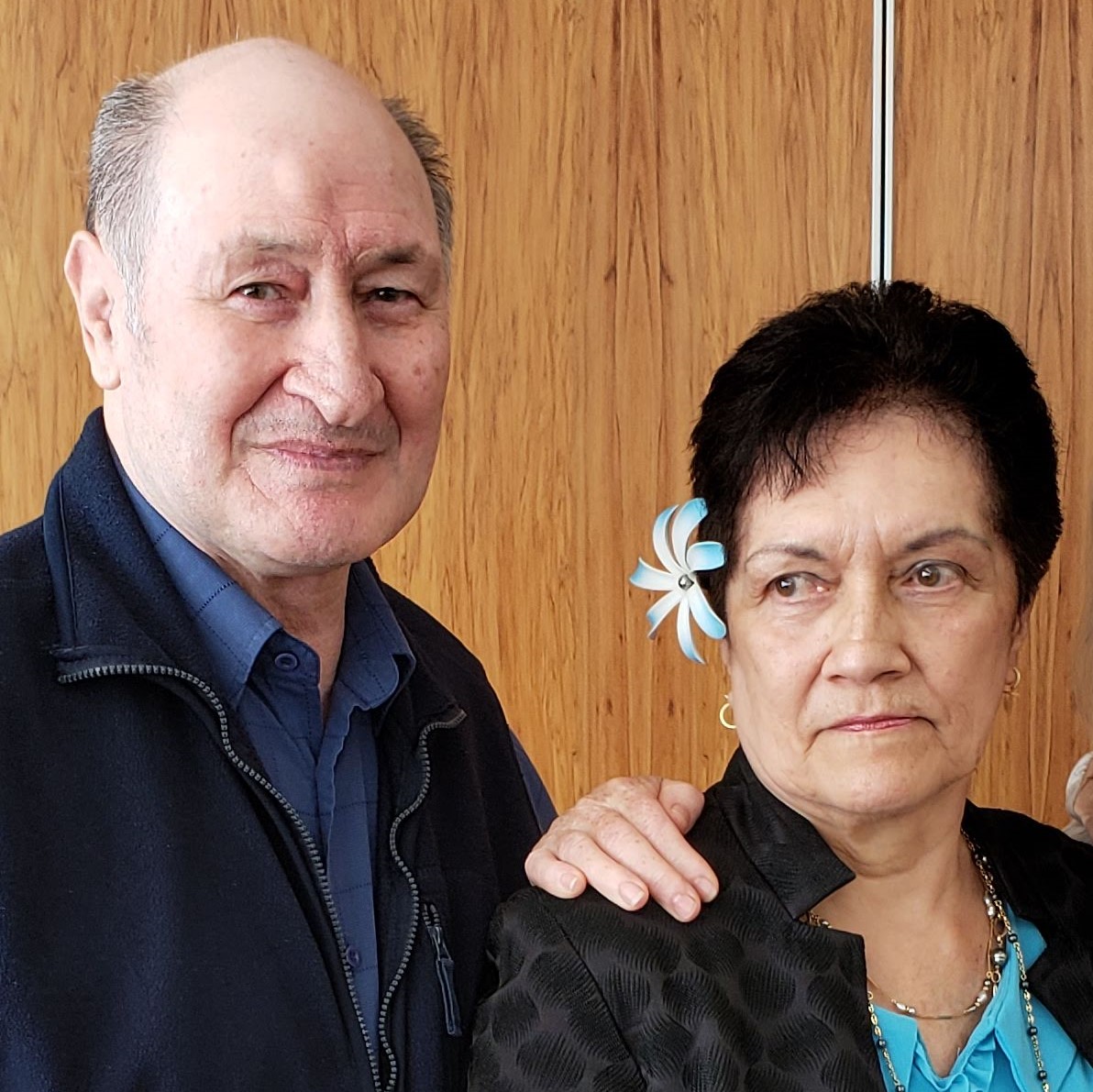
Mo and Maeva are both museum volunteers and members of Dinsdale Ward
While we were out for our regular walk around the neighborhood a little later that morning, we happened to encounter Mo and Maeva, volunteer museum guides who also are members of Dinsdale Ward. Although they are older than we are, Mo and Maeva have not been married very long—not to each other, anyway. They met while serving as ordinance workers in the Hamilton Temple and are eager to return to service there when the temple reopens. We had been concerned about them because both had been experiencing some difficult health challenges that we feared might prevent them from serving as ordinance workers again. Maeva has been enduring a painful foot condition for many years, and Mo had to have surgery to remove a tumor a few months ago. When we met them during our walk, Maeva was happy to tell us that she had finally been blessed with some relief from her foot pain, but the report from Mo was not as positive: his doctor had told him that another surgery would be necessary. Would Elder H be willing to come over and give him a priesthood blessing? Michael promised to do so after he had showered and changed into more appropriate clothing.
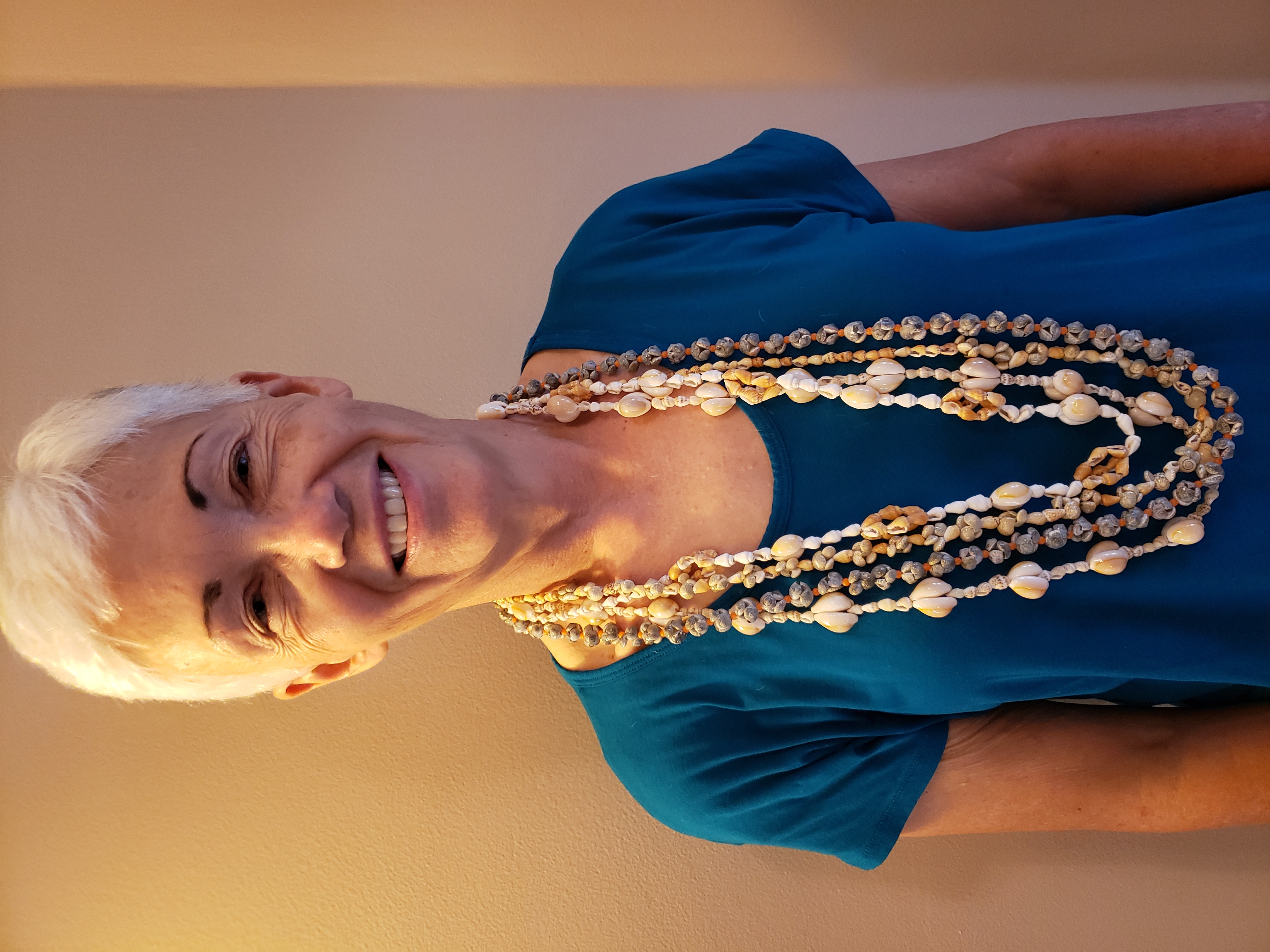
Shell necklaces from Maeva and Mo
Nancy decided not to accompany Michael to Mo and Maeva’s flat, staying behind to keep our last loads of laundry going and continue sorting items into suitcases. Later, however, she was sorry she had not gone. The couple greeted Michael as they usually do, with “Bonjour! Salut!” and kisses on both cheeks. (Maeva is from New Caledonia and prefers doing things the French way whenever possible, and she especially appreciates Michael because he can converse with her in her native tongue.) As he talked with them before giving the priesthood blessing Mo had requested, Michael realized that they had complete faith in God’s power to heal Mo through the blessing Michael would pronounce, and he was deeply moved by their trust both in God and in himself. However, as much as he would have liked to promise Mo that he would be healed, Michael did not feel impressed to say so. Rather, he felt the Spirit prompting him to reassure Mo that the Lord was mindful of him and would allow him to serve in his calling again. “I blessed him with a sense of peace,” he told Nancy later. As Mo tearfully embraced him, Michael understood that although his friend had hoped to be healed, Mo trusted God enough to humbly accept his will and would indeed be at peace.
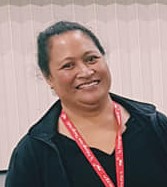
Sose, Dinsdale Ward’s Relief Society president
After Michael returned (laden with some delicate shell necklaces and a set of hand-painted table linens that Mo and Maeva had bestowed as parting gifts), we spent the remainder of the day packing and repacking our suitcases, trying to make sure that none of them exceeded the airline’s weight limit, and throwing a lot of stuff into the rubbish bin. Our work was repeatedly interrupted by friends who arrived to pick up items from our catalog of household giveaways and leave us tokens of their regard. Sose, the Samoan-born Relief Society president who had often come to our door bearing great quantities of dinner, now brought us great quantities of chocolate “lollies” in exchange for our bathroom scale. She also presented each of us with a lavalava (wrap skirt) she had stitched herself. How we love this wonderful woman! At the very first sacrament meeting we attended in Dinsdale Ward, Sose had given a talk about Esther, reminding us that when we find ourselves in a difficult situation, perhaps it’s because the Lord placed us there for just “such a time,” giving us the opportunity to use our unique abilities to accomplish something important. Like Esther, Sose has used her position and her big heart to help the people of Dinsdale Ward survive emotionally and spiritually during these difficult months when we haven’t been able to meet at church.
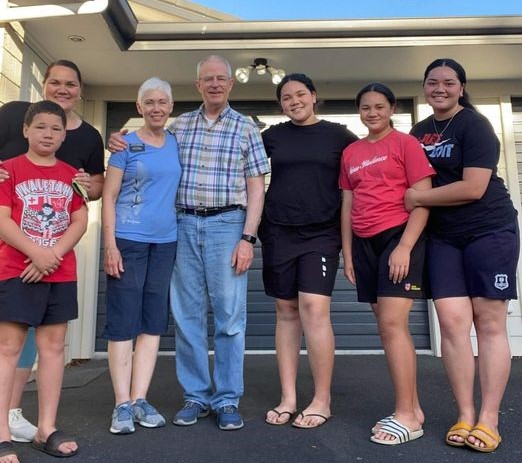
Nancy and Michael with Jo and Harris, Paea, Valerie, and Susana
Shortly after Sose left, we heard another knock at the door. This time it was Jo, our former next-door neighbor, with several of her children. Jo is a single mother who recently completed a university degree, taking classes for years while simultaneously caring for her large family. We have so much admiration for her and her kids, who are polite, kind, and a lot of fun! Nancy is especially grateful for Jo’s daughter Susana, who spent hours patiently helping her learn the Tahitian dance that a group of Relief Society women were performing at a ward activity. We were happy to give our Ticket to Ride game to Jo and her kids, who also brought us some Whittaker’s chocolate bars so we could share one of New Zealand’s best products with our family in America.
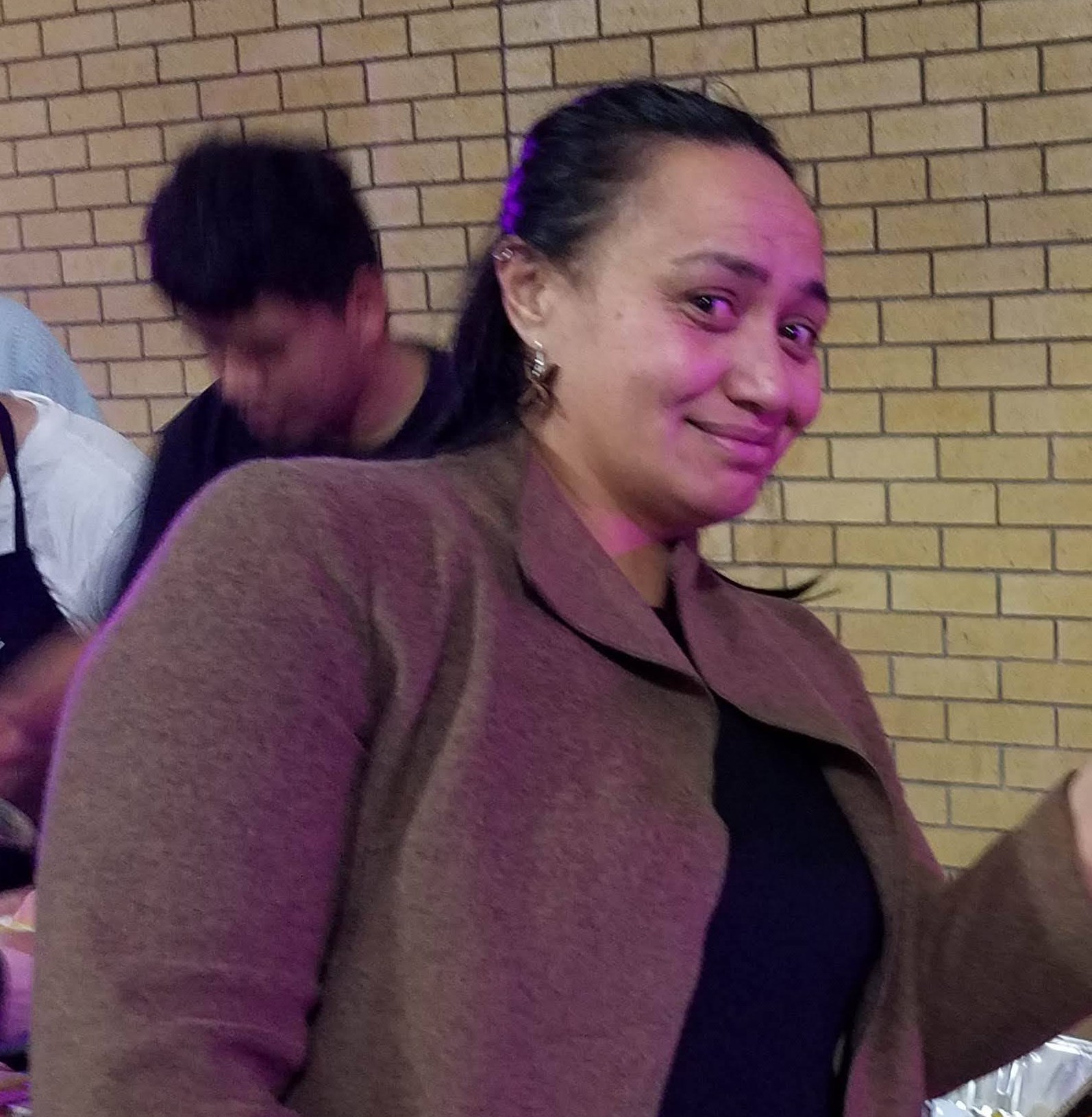
Stacey, caught on a rare occasion when she was not behind the camera at a ward activity
Next to stop by was Stacey, whose enthusiasm for taking scores of pictures at every ward activity inspired Bishop K to call her as the official ward photographer. She, too, brought us some Whittaker’s chocolate. (Hmm. Why does everyone in Dinsdale Ward think we like chocolate?) While Stacey was in our living room, she noticed a large framed photo that we had saved from the museum’s Light and Life exhibit when the show was taken down to make room for the Sacrifice and Consecration exhibit. Were we going to take the photo with us? If not, could she have it? We were delighted that Stacey appreciated the photo’s depiction of Victor, a disabled Ukrainian man, and the contrast between his obvious joie de vivre and the indifference of a man walking down the same street. We happily helped Stacey fit the photograph into her car and then waved goodbye as she drove off.

Teniqua’s promo for The Great Kiwi Bake-Off
At this point, most of what we had left to give away was food. Elder and Sister F, who had moved into the other missionary flat in our complex a few months earlier, are vegetarian and therefore seemed the right recipients for the dried legumes we had not been able to finish. It was harder to part with our collection of herbs and spices—more than thirty little brown boxes that had made all the difference between the dull and the delicious—but we felt better when we saw how excited Teniqua was to receive them. Teniqua, a young mother who lives down the street, loves to cook and especially to bake. In fact, she was a recent contestant on The Great Kiwi Bake-Off. She didn’t make it beyond the third or fourth episode, but said she was thrilled just to be on the show to begin with. We’re confident that she will use our seasonings with panache.
We were consuming the last perishables from the refrigerator for dinner when Michael’s phone rang. It was Meli, the mother of a family of six who all had participated faithfully in the Dinsdale Ward choir. They, too, wanted to say farewell and had a parting gift for us, but unexpected company prevented them from coming to our flat—would we mind dropping by their place for a few minutes instead? So after we had washed the dishes, we headed out to say yet another goodbye. Meli had been sustained as president of Dinsdale Ward’s Young Women’s organization just before we arrived in New Zealand. Speaking in sacrament meeting a couple of months later, Meli said that at first she had told the bishop that she couldn’t accept the call to YW because she was taking a Pathway class that met the same night as the weekly youth activity. She also confessed that she didn’t want to accept the call because she felt like she lacked the necessary leadership experience. But the bishop encouraged her to pray about it, and as she did, the Spirit kept telling her that she should accept. When Meli learned that the weekly youth activity was switching to a different weeknight at the beginning of the year, she realized that her main excuse had been swept away, so she told the bishop she would do it. Observing Meli and the young women she has presided over during the past two years, we can testify that she has been a very effective YW leader and a great example to the whole ward. We’ve been impressed by how loving, cheerful, and patient Meli and her husband Terri are with their children, and how well they’ve encouraged each of the kids to develop their unique talents—especially their two daughters with autism.
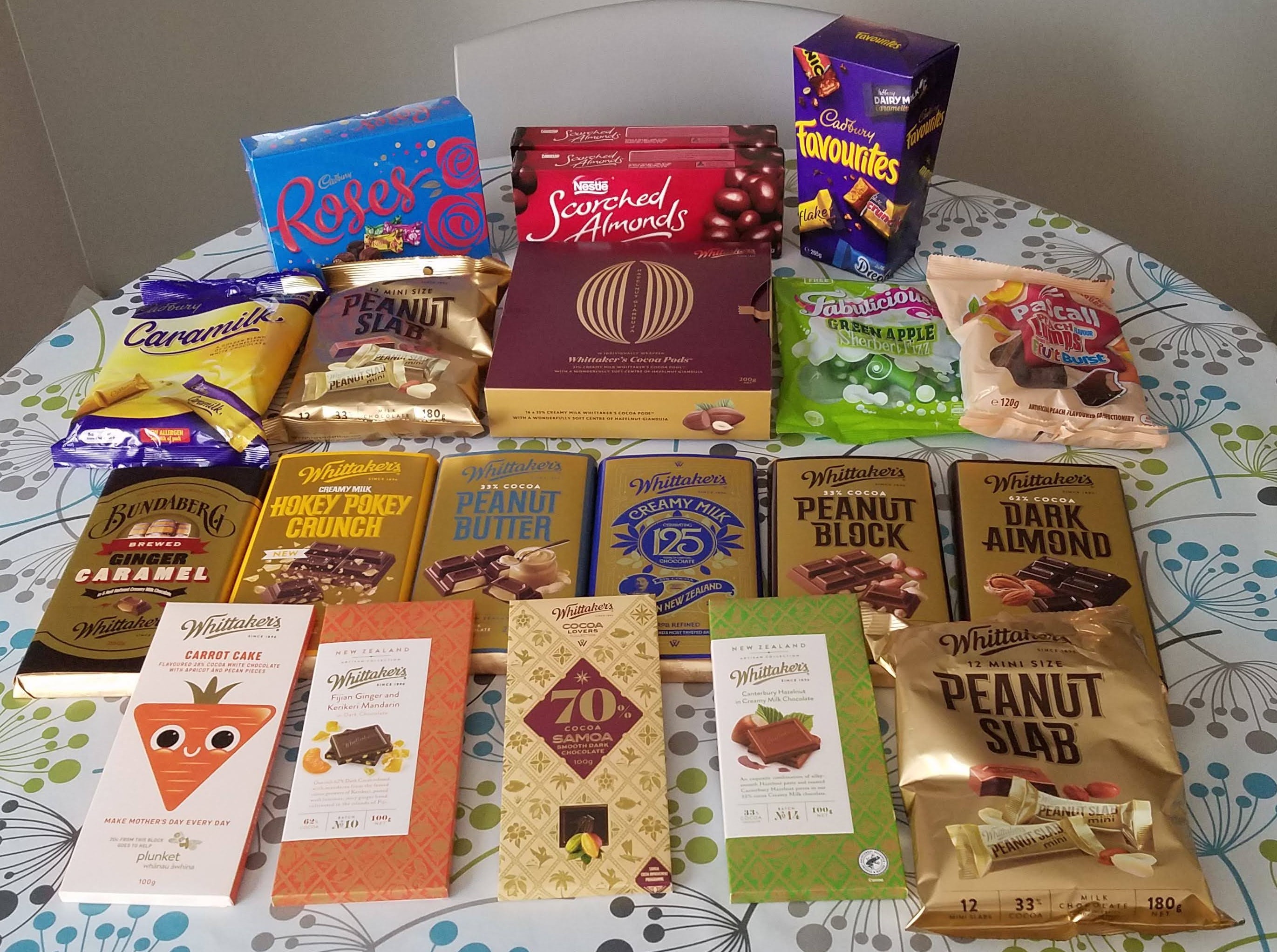
Our chocolate taonga (treasures)
So what did Meli, Terri, Tai, Fivarikah, Melite, and Ejay give us to remember them by? Whittaker’s chocolate, of course! Each of them had chosen their favorite flavor, so we now had six more bars to add to our stockpile. We were kind of worried about how we were going to fit over 5.5kg (12+ lbs) of candy into our already weighty baggage, but we were determined to try because all that chocolate represented the generosity and love of our sweet brothers and sisters in Dinsdale Ward. We wish we could leave something precious with each of our Kiwi friends. They seem to think we already have, simply by serving as missionaries in their land. But when we weigh our two years of service against all we’ve learned and the overwhelming love we’ve felt from the people we were called to serve, the scales refuse to balance. Yes, we consecrated these two years to the Lord’s service, but it doesn’t feel like it’s been a sacrifice at all.
What a wonderful experience for you and Mike. Thank you for sharing so much through your blog reports. Stephen and I watched “Building for Eternity” some time ago when it was first released. You are so right about needing a hanky in your hand while watching. It was a terrific story and the film itself was simply excellent. I am so pleased that both of you were able to be in NZ “for such a time as this,” when your specific talents could be used so effectively. We love you❣️
What a blessing your service has been to your new friends, and what a blessing for you to have known them. The riches you have gained and distributed are beyond counting, except of course for the pounds of chocolate!